At the Swann, there is a spot for haute couture, with two period creations by the great fashion designer, Jacques Doucet, including the opera costume worn by the Marquise d’Aligre around 1900 and described by Marcel Proust in La Recherche as being on the shoulders of the Marquise de Cambremer, and also a place for bookbindings, with reproductions of the thirteen plates from volumes of the bound novel by Jean de Gonet.
At the Alexandre Vialatte, the Bestiaire Fantastique sculptures by his friend, Philippe Kaeppelin, are on permanent display in the rooms on the ground floor. In the adjoining display cabinets are some of Vialatte’s personal effects kindly made available to the hotel by his son, Pierre Vialatte, including his press cards, his passport and even his glasses.
At the Marcel Aymé, the Passe Muraille covers the walls, in the form of a monumental plaster print created and signed by Jean Marais for the bronze statue in the Place Marcel Aymé. The shades of a portrait of the writer and the ‘chat perché’, Alphonse, sculpted by Jean-Claude Sadoine, stand alongside two original tiles that are souvenirs of Marcel Aymé’s childhood in the Tuilerie.
At the Flaubert, a contemporary piece by the painter Hastaire, the “Portrait of Flaubert”, printed on a tarpaulin, is fixed to an outside wall in the courtyard, while the huge plaster cast of his statue by Bernstamm is displayed in the writer’s study. At the Alexandre Vialatte, there is a permanent exhibition of golden sculptures taken from his friend, Philippe Kaeppelin’s, Bestiaire Fantastique, along with the comical descriptions he wrote about them.
The Rimbaud Hotel has a copy of Ernest Pignon-Ernest’s silkscreen on newsprint, thereby rerouting it from its vocation as ephemeral and urban art, and copies of handwritten letters by the poet, generously donated by the Bibliothèque Jaques Doucet. The Jules Verne, meanwhile, boasts period goose games adapted to Around the World in Eighty Days and the original map of Mysterious Island drafted in English by the writer and reproduced by the Éditions des Saints Pères.
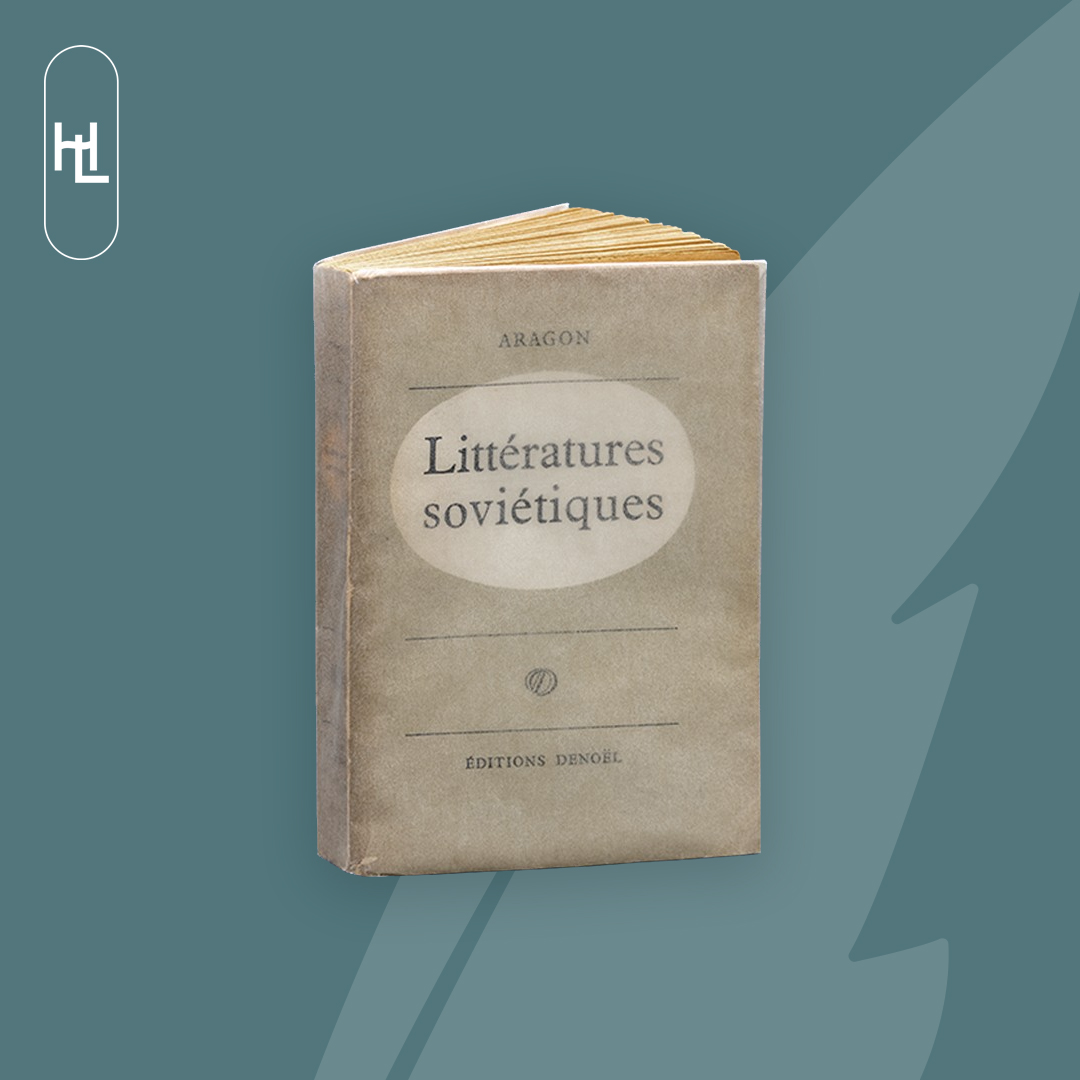
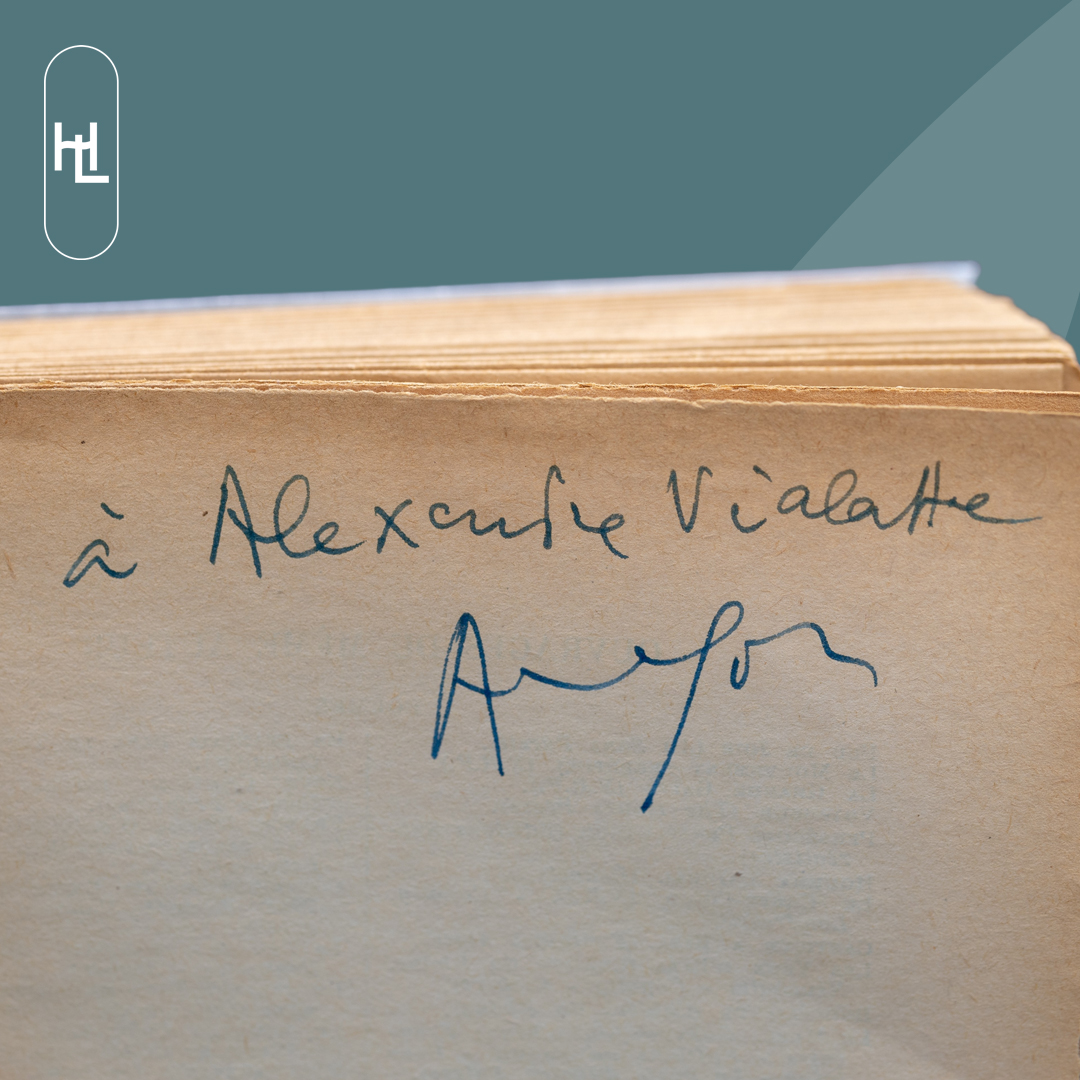 Littératures soviétiques, Louis Aragon, éditions Denoël, 1955, avec un envoi autographe, aussi insolite que laconique, à Alexandre Vialatte, lui-même pourfendeur de la Russie communiste.
Littératures soviétiques, Louis Aragon, éditions Denoël, 1955, avec un envoi autographe, aussi insolite que laconique, à Alexandre Vialatte, lui-même pourfendeur de la Russie communiste.
© Hôtel Littéraire Alexandre Vialatte
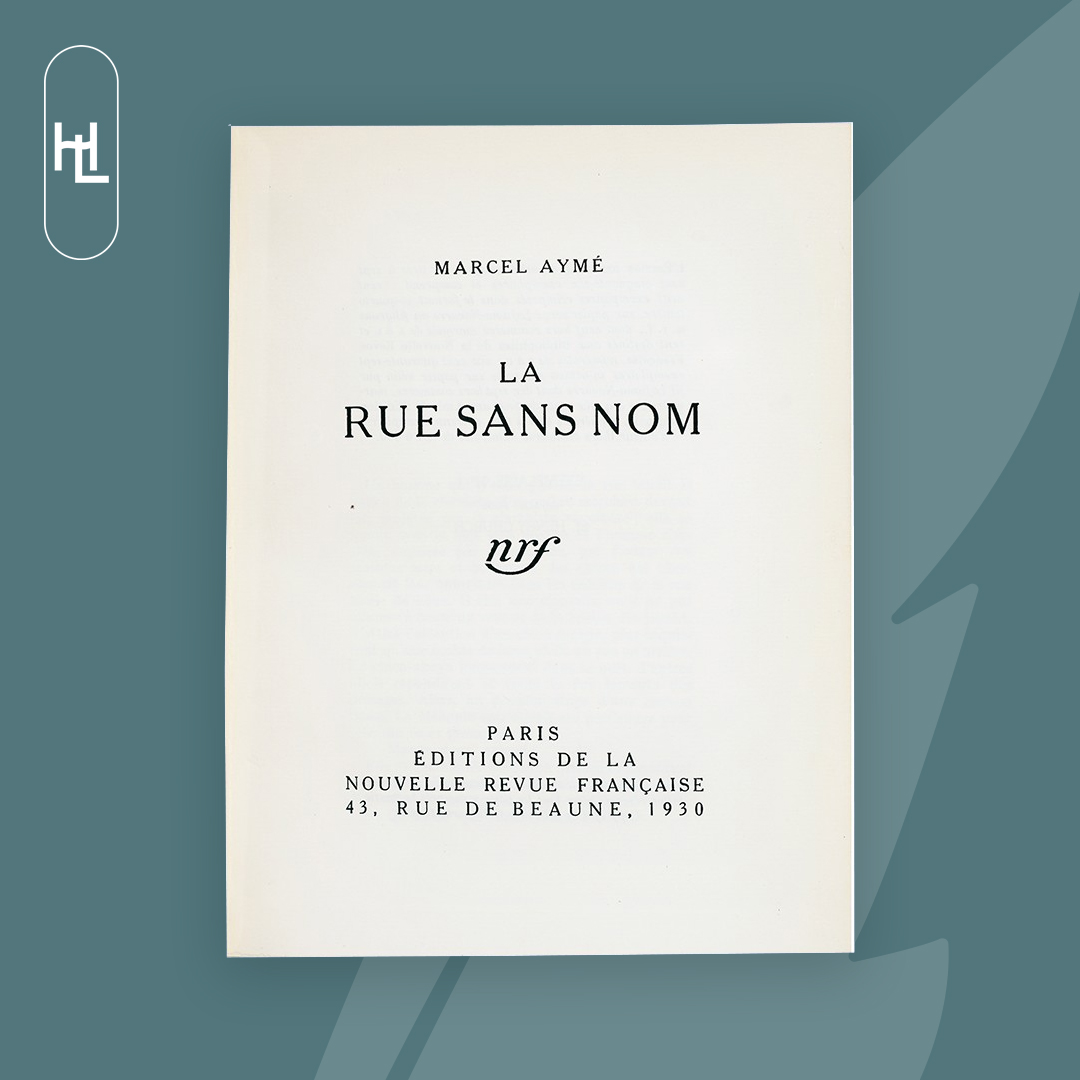
 La rue sans nom, Marcel Aymé, éditions Gallimard, 1930. Cet exemplaire réimposé de l’édition originale porte non seulement le n° 1 mais aussi la mention “imprimé pour M. Henry Church”, sur les 100 destinés aux Bibliophiles de la Nouvelle Revue Française.
La rue sans nom, Marcel Aymé, éditions Gallimard, 1930. Cet exemplaire réimposé de l’édition originale porte non seulement le n° 1 mais aussi la mention “imprimé pour M. Henry Church”, sur les 100 destinés aux Bibliophiles de la Nouvelle Revue Française.
© Hôtel Littéraire Marcel Aymé
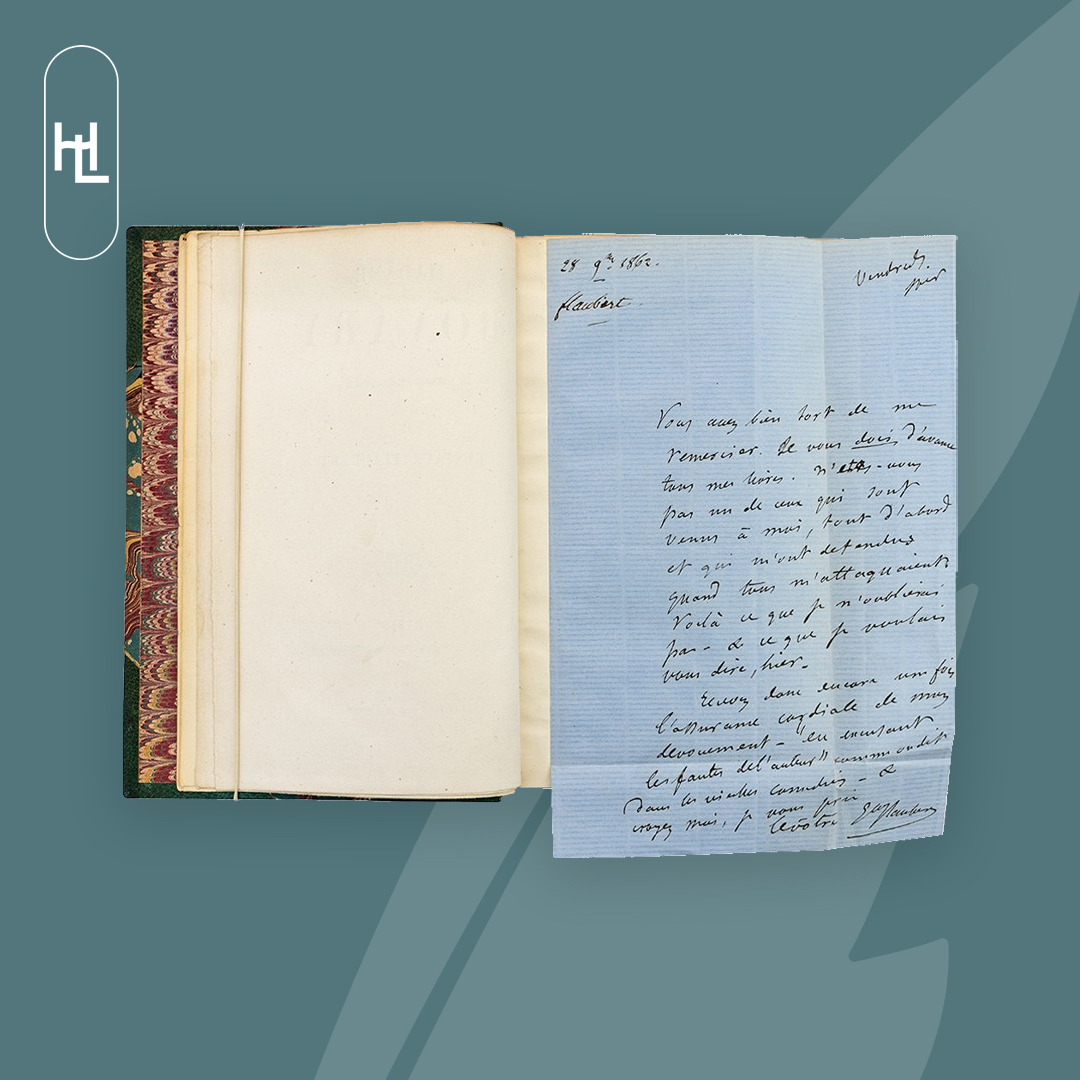
 Madame Bovary, Gustave Flaubert, Michel Lévy, 1857. Édition originale sur papier vélin fort. Envoi autographe signé : « à Mr Camille Doucet / hommage de l’auteur / Gve Flaubert ». Joint une lettre autographe adressée à Camille Doucet, 28 novembre 1862, dont voici la transcription : Vendredi soir. « Vous avez bien tort de me remercier. Je vous dois d’avance tous mes livres. N’êtes-vous pas un de ceux qui sont venus à moi, tout d’abord et qui m’ont défendu quand tous m’attaquaient ? Voilà ce que je n’oublierai pas – & que je voulais vous dire, hier. Recevez donc encore une fois l’assurance cordiale de mon dévouement – « en excusant les fautes de l’auteur » comme on dit dans les vieilles comédies – & croyez-moi, je vous prie Le vôtre Gve Flaubert. »
Madame Bovary, Gustave Flaubert, Michel Lévy, 1857. Édition originale sur papier vélin fort. Envoi autographe signé : « à Mr Camille Doucet / hommage de l’auteur / Gve Flaubert ». Joint une lettre autographe adressée à Camille Doucet, 28 novembre 1862, dont voici la transcription : Vendredi soir. « Vous avez bien tort de me remercier. Je vous dois d’avance tous mes livres. N’êtes-vous pas un de ceux qui sont venus à moi, tout d’abord et qui m’ont défendu quand tous m’attaquaient ? Voilà ce que je n’oublierai pas – & que je voulais vous dire, hier. Recevez donc encore une fois l’assurance cordiale de mon dévouement – « en excusant les fautes de l’auteur » comme on dit dans les vieilles comédies – & croyez-moi, je vous prie Le vôtre Gve Flaubert. »
© Hôtel Littéraire Gustave Flaubert.
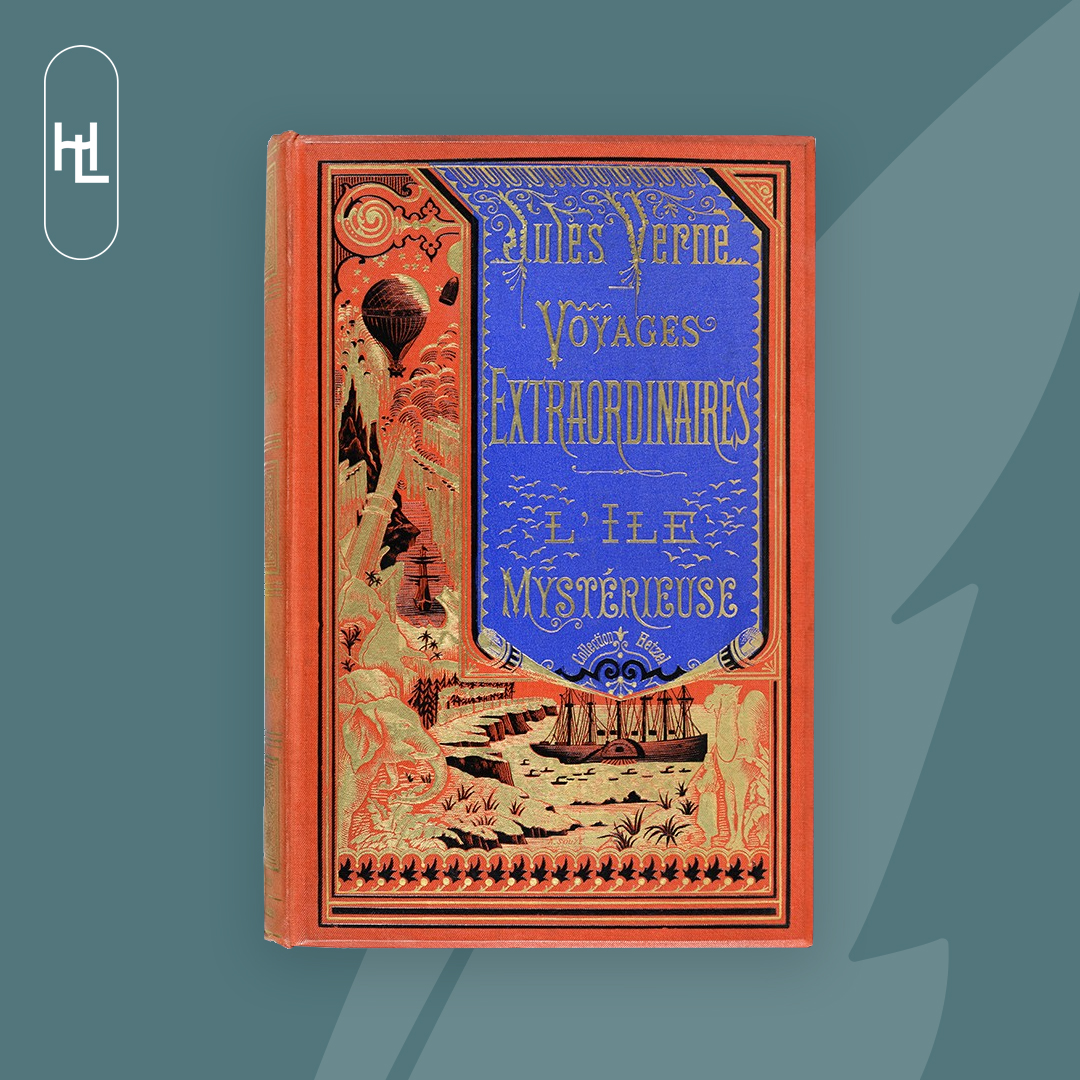
 L’île mystérieuse, Jules Verne – Les Voyages extraordinaires. Hetzel, Paris 1875. Grd. in-8. Première édition illustrée et première reliure. Cartonnage d’éditeur de la série au ballon bicolore, dite « à la bannière » bleue sur fond rouge, dite « aux mouettes ». Ce cartonnage a été employé pour la première fois pour L’Île mystérieuse et il porte uniquement pour ce titre un vol de mouettes. Cartonnage par Lenègre. Graveur Souze. Illustrations de Jules Férat.
L’île mystérieuse, Jules Verne – Les Voyages extraordinaires. Hetzel, Paris 1875. Grd. in-8. Première édition illustrée et première reliure. Cartonnage d’éditeur de la série au ballon bicolore, dite « à la bannière » bleue sur fond rouge, dite « aux mouettes ». Ce cartonnage a été employé pour la première fois pour L’Île mystérieuse et il porte uniquement pour ce titre un vol de mouettes. Cartonnage par Lenègre. Graveur Souze. Illustrations de Jules Férat.
© Hôtel Littéraire Jules Verne.
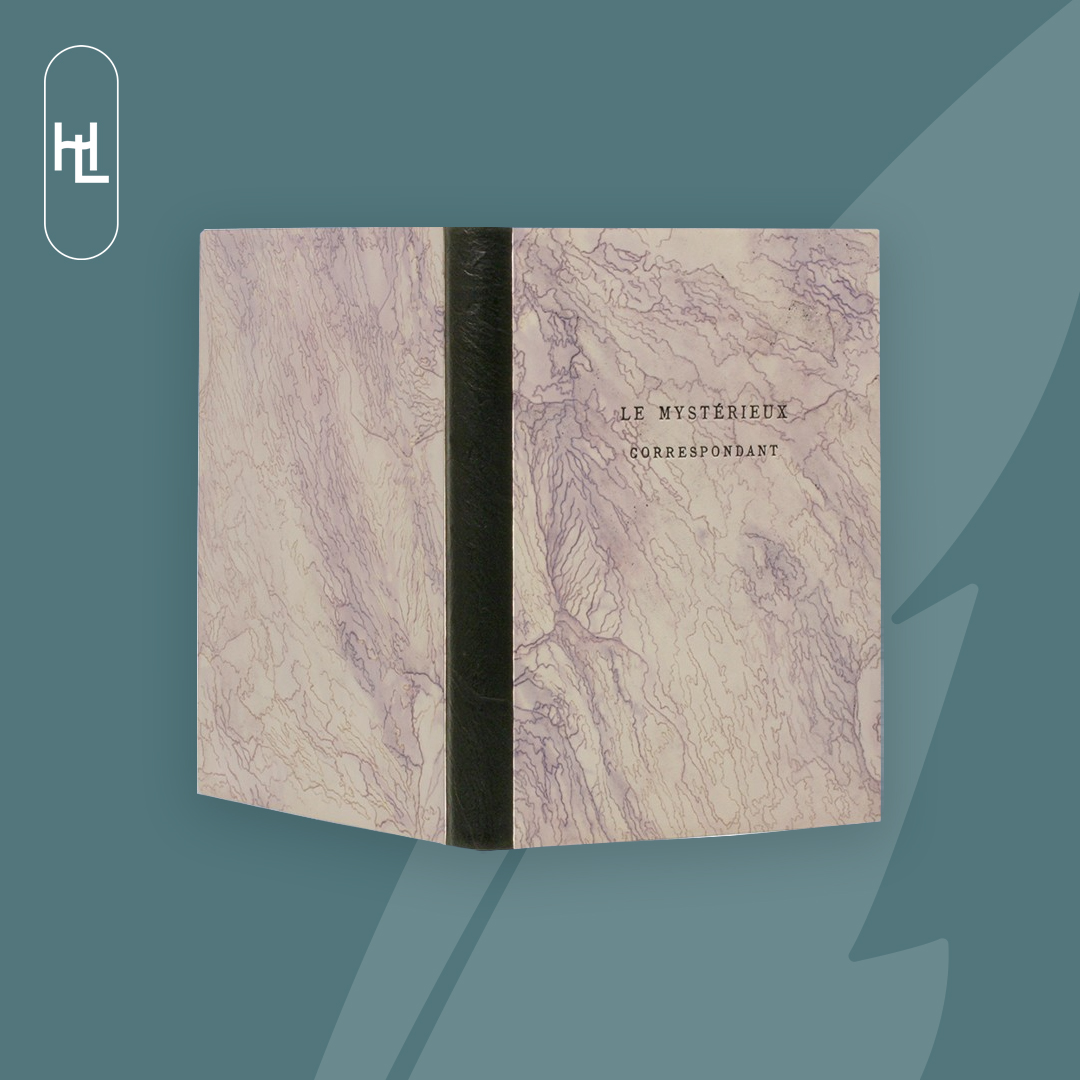
 Le mystérieux correspondant et autres nouvelles inédites, Marcel Proust, Fallois, 2019. Exemplaire n° 1. Parmi les cent-quinze exemplaires du tirage de tête de l’édition originale, cent ont été tirés sur Vélin Rivoli Blanc numérotés de 1 à 100. Exemplaire relié par Nobuko Kiyomiya : Reliure semi-souple. Dos en veau noir gaufré et brulé sur les relief. Deux plats sont en veau blanc aussi entièrement gaufrés, brûlés et peints en tons rose-mauve. Doublures et gardes en papier Japon marron doré. Le titre est placé sur le premier plat à l’oser gris-anthracite fait par Carole Laporte. Chemise et étui assortis.
Le mystérieux correspondant et autres nouvelles inédites, Marcel Proust, Fallois, 2019. Exemplaire n° 1. Parmi les cent-quinze exemplaires du tirage de tête de l’édition originale, cent ont été tirés sur Vélin Rivoli Blanc numérotés de 1 à 100. Exemplaire relié par Nobuko Kiyomiya : Reliure semi-souple. Dos en veau noir gaufré et brulé sur les relief. Deux plats sont en veau blanc aussi entièrement gaufrés, brûlés et peints en tons rose-mauve. Doublures et gardes en papier Japon marron doré. Le titre est placé sur le premier plat à l’oser gris-anthracite fait par Carole Laporte. Chemise et étui assortis.
© Hôtel Littéraire Le Swann.
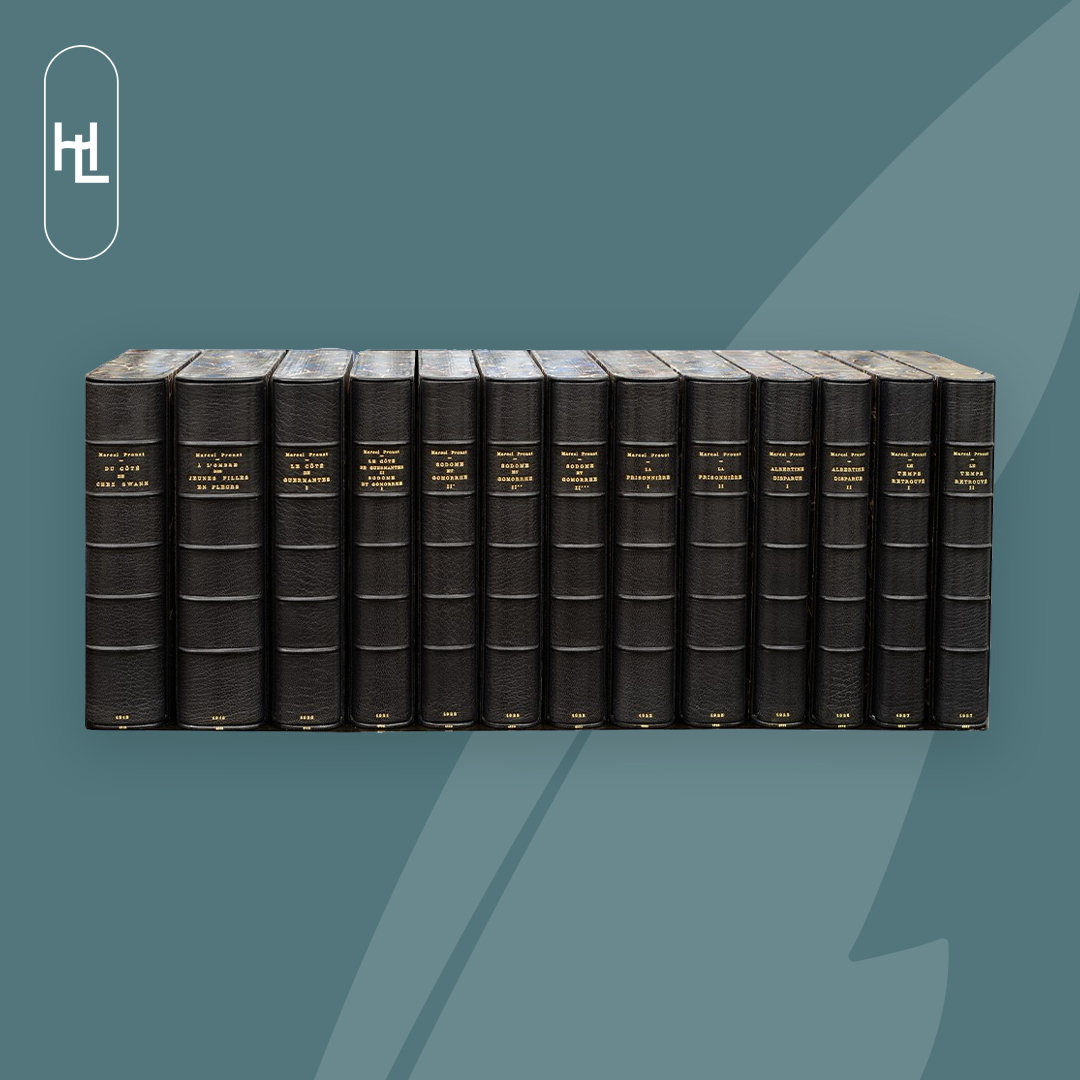
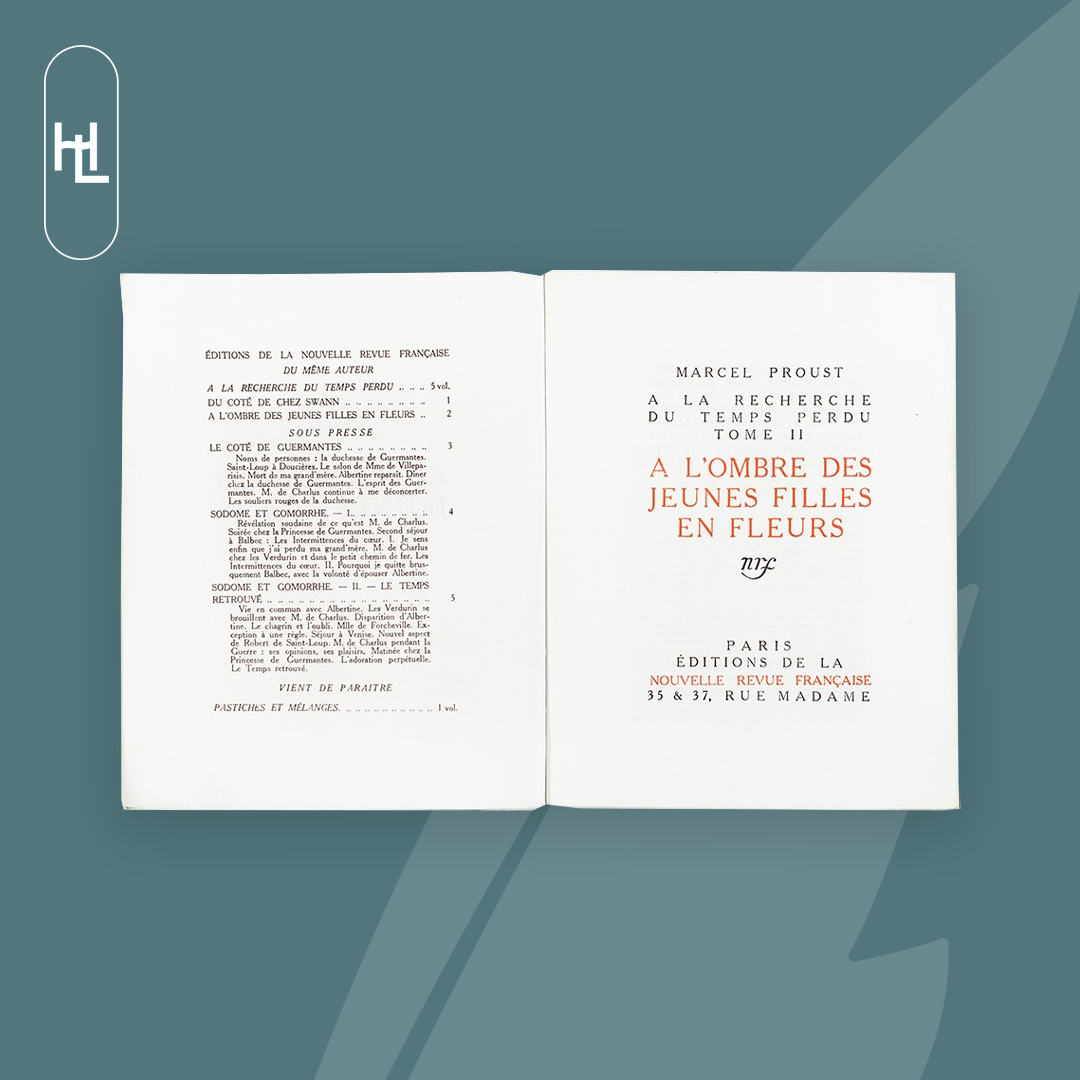 À la recherche du temps perdu, Marcel Proust, en treize volumes, Éditions de la Nouvelle Revue Française, 1919-1927. 13 volumes in-8 Tellière (215 x 160 mm). Édition originale, sauf pour Du côté de chez Swann, qui avait été publié par Grasset, en 1913. Tous les volumes sont réimposés sur Lafuma pur fil (seul grand papier), nominatifs au nom de Maurice Heine et avec le même numéro 89. Ils sont aussi protégés par une chemise étui et un emboitage en maroquin bleu marine réalisé par Jean Bernard Alix.
À la recherche du temps perdu, Marcel Proust, en treize volumes, Éditions de la Nouvelle Revue Française, 1919-1927. 13 volumes in-8 Tellière (215 x 160 mm). Édition originale, sauf pour Du côté de chez Swann, qui avait été publié par Grasset, en 1913. Tous les volumes sont réimposés sur Lafuma pur fil (seul grand papier), nominatifs au nom de Maurice Heine et avec le même numéro 89. Ils sont aussi protégés par une chemise étui et un emboitage en maroquin bleu marine réalisé par Jean Bernard Alix.
© Hôtel Littéraire Le Swann
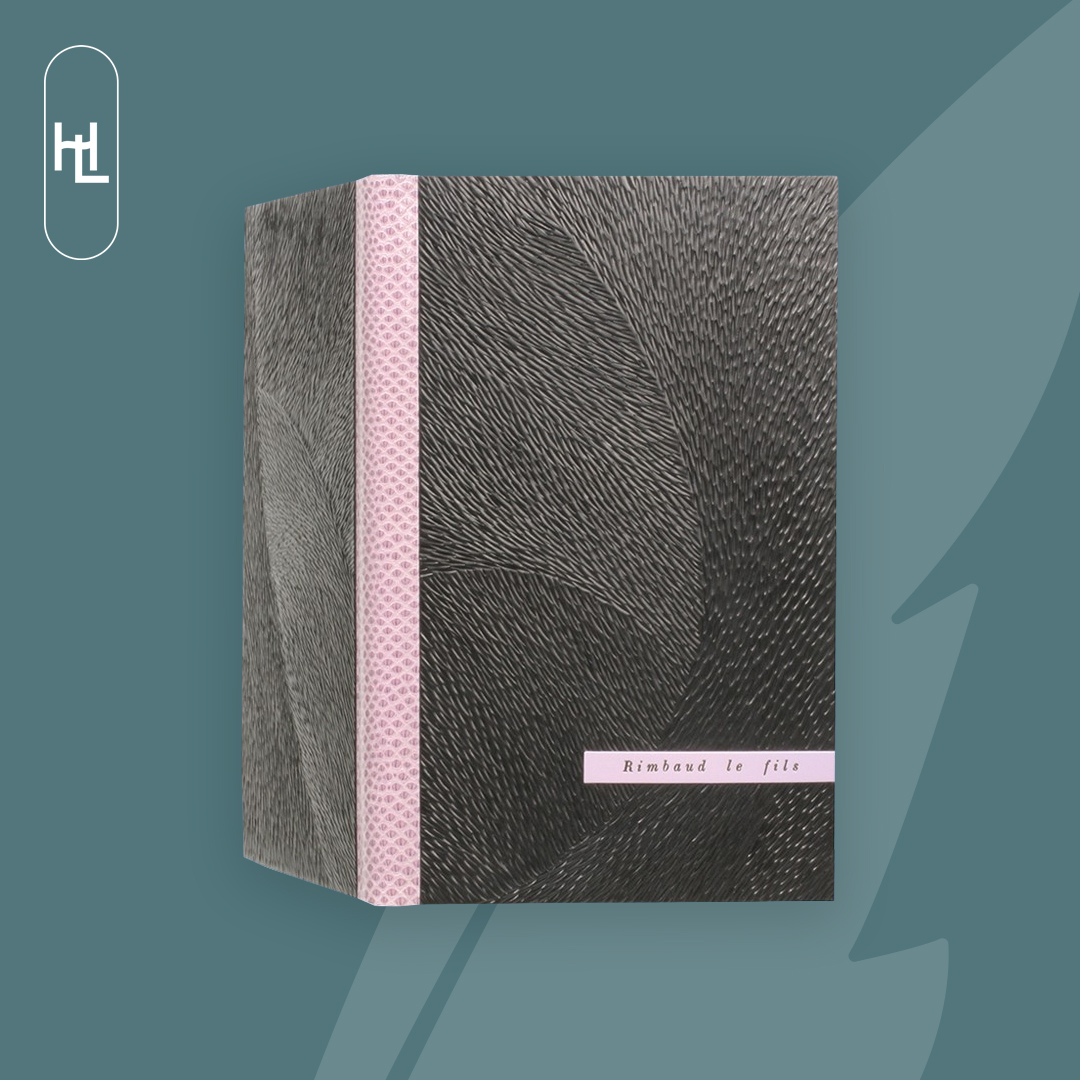
 Rimbaud le Fils, Pierre Michon, Gallimard, 1991, édition originale. Reliure réalisée par Nobuko Kiyomiya : Plats de veau noir entièrement recouverts d’un décor finement martelé selon trois orientations. Italiques du titre poussées à l’œser marron-gris sur une pièce de box lilas, avec un dos de peau de serpent d’eau lilas, des doublures et gardes de papier japon mordoré.
Rimbaud le Fils, Pierre Michon, Gallimard, 1991, édition originale. Reliure réalisée par Nobuko Kiyomiya : Plats de veau noir entièrement recouverts d’un décor finement martelé selon trois orientations. Italiques du titre poussées à l’œser marron-gris sur une pièce de box lilas, avec un dos de peau de serpent d’eau lilas, des doublures et gardes de papier japon mordoré.
© Hôtel Littéraire Arthur Rimbaud.
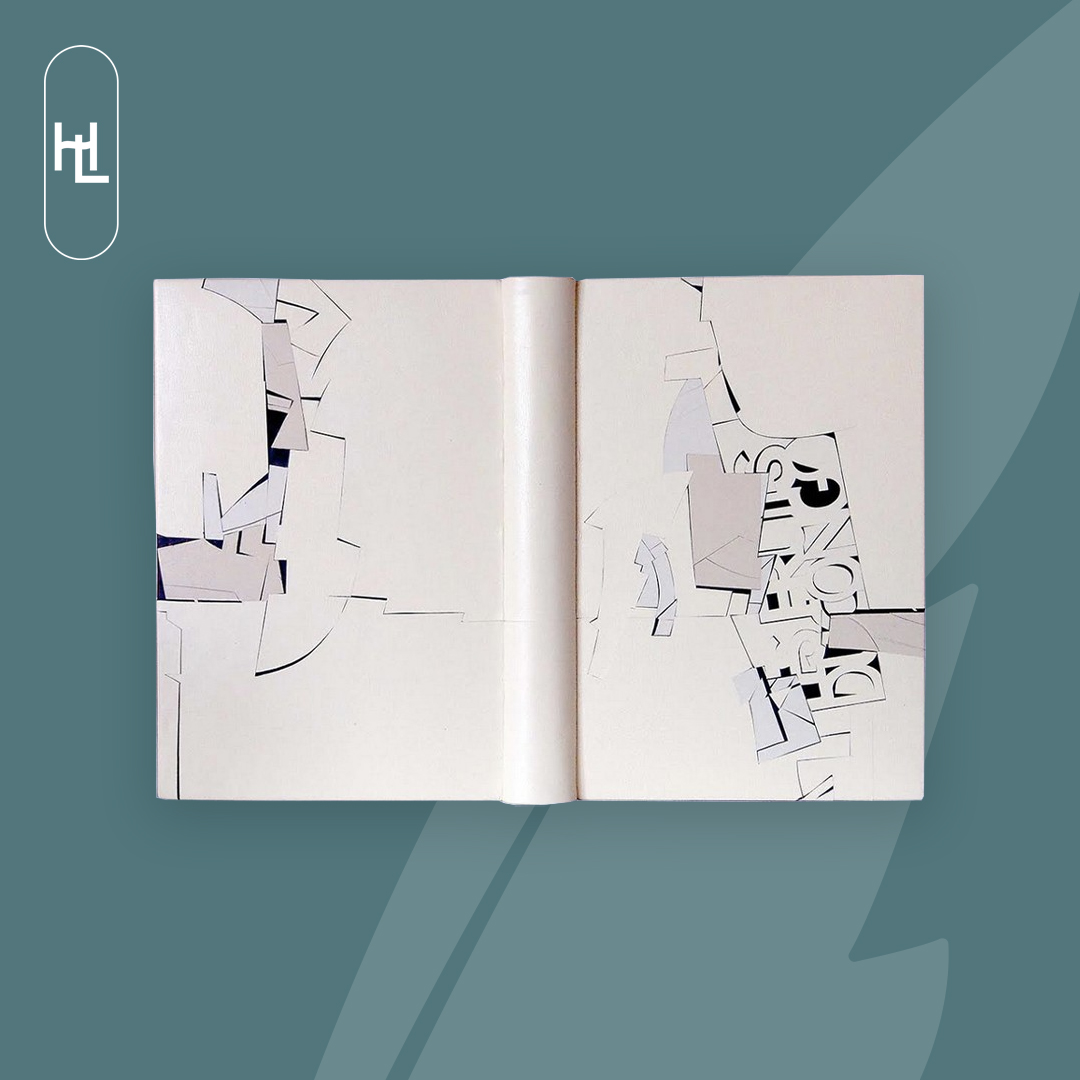
 Les Fruits du Congo, Alexandre Vialatte, Paris, Gallimard, 1951, édition originale n° 46/50 velin pur fil. La reliure plein box crème a été réalisée en 2019 par Alain Koren, grande figure de la reliure contemporaine, avec un décor de mosaïque déstructurée sur underlay foncé et un titre graphique également mosaïqué (208 mm x 143 mm.)
Les Fruits du Congo, Alexandre Vialatte, Paris, Gallimard, 1951, édition originale n° 46/50 velin pur fil. La reliure plein box crème a été réalisée en 2019 par Alain Koren, grande figure de la reliure contemporaine, avec un décor de mosaïque déstructurée sur underlay foncé et un titre graphique également mosaïqué (208 mm x 143 mm.)
© Hôtel Littéraire Alexandre Vialatte.
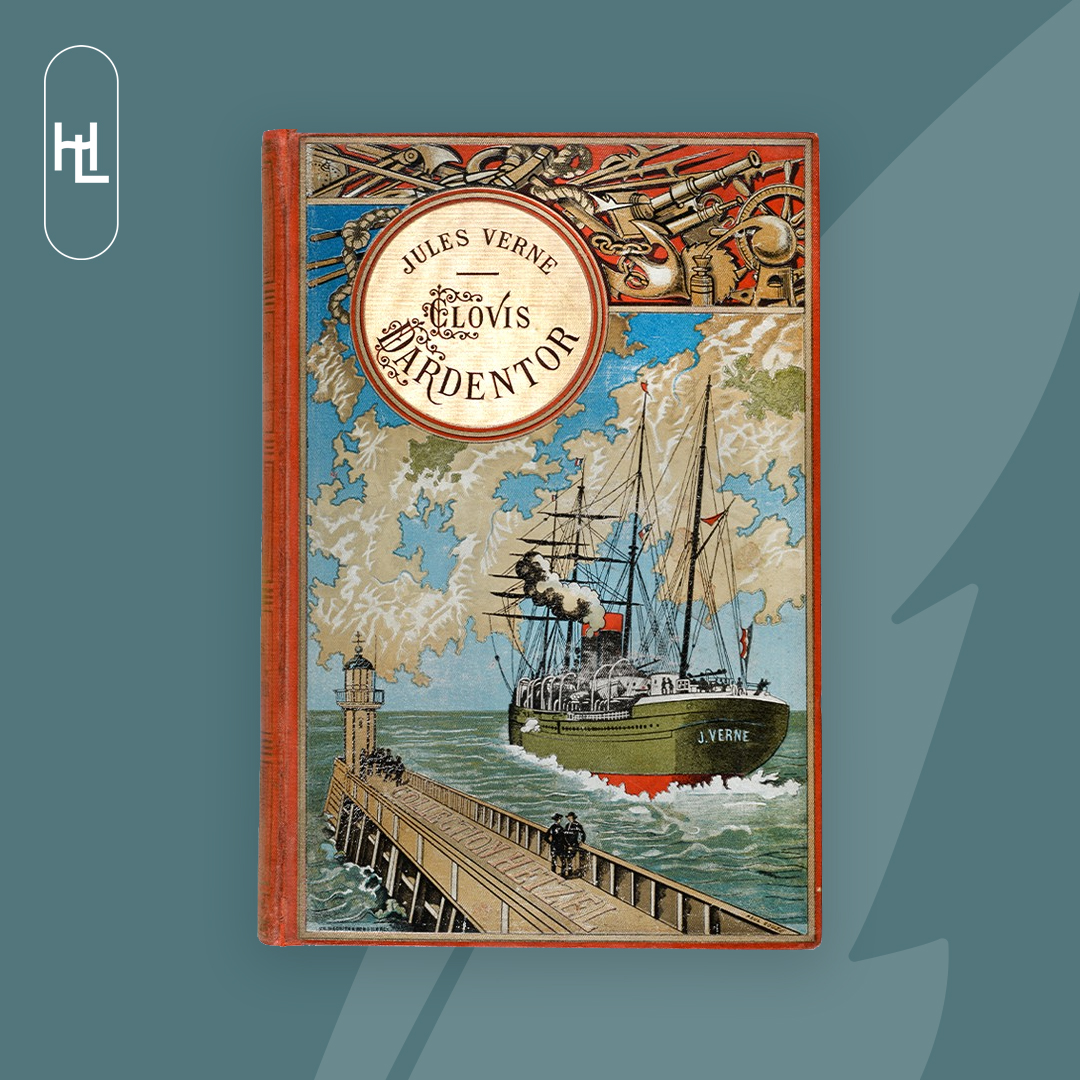
 Clovis Dardentor, Jules Verne, Voyages extraordinaires, Paris, Bibliothèque d’éducation et de récréation J. Hetzel et cie, 1896, première édition illustrée et premier cartonnage. In-8. Volume simple. Cartonnage polychrome rouge « Au Steamer » et au macaron doré (qui caractérise les premiers tirages, alors que les macarons rouges sont mis pour les rééditions). Décors utilisés entre 1892 et 1906. Avec l’envoi imprimé : « A mes petits-fils, Michel, Georges, Jean Verne, Jules Verne ». Gravure de Souze et reliure de Magnier. 45 illustrations par Léon Benett et six gravures couleurs.
Clovis Dardentor, Jules Verne, Voyages extraordinaires, Paris, Bibliothèque d’éducation et de récréation J. Hetzel et cie, 1896, première édition illustrée et premier cartonnage. In-8. Volume simple. Cartonnage polychrome rouge « Au Steamer » et au macaron doré (qui caractérise les premiers tirages, alors que les macarons rouges sont mis pour les rééditions). Décors utilisés entre 1892 et 1906. Avec l’envoi imprimé : « A mes petits-fils, Michel, Georges, Jean Verne, Jules Verne ». Gravure de Souze et reliure de Magnier. 45 illustrations par Léon Benett et six gravures couleurs.
© Hôtel Littéraire Jules Verne.
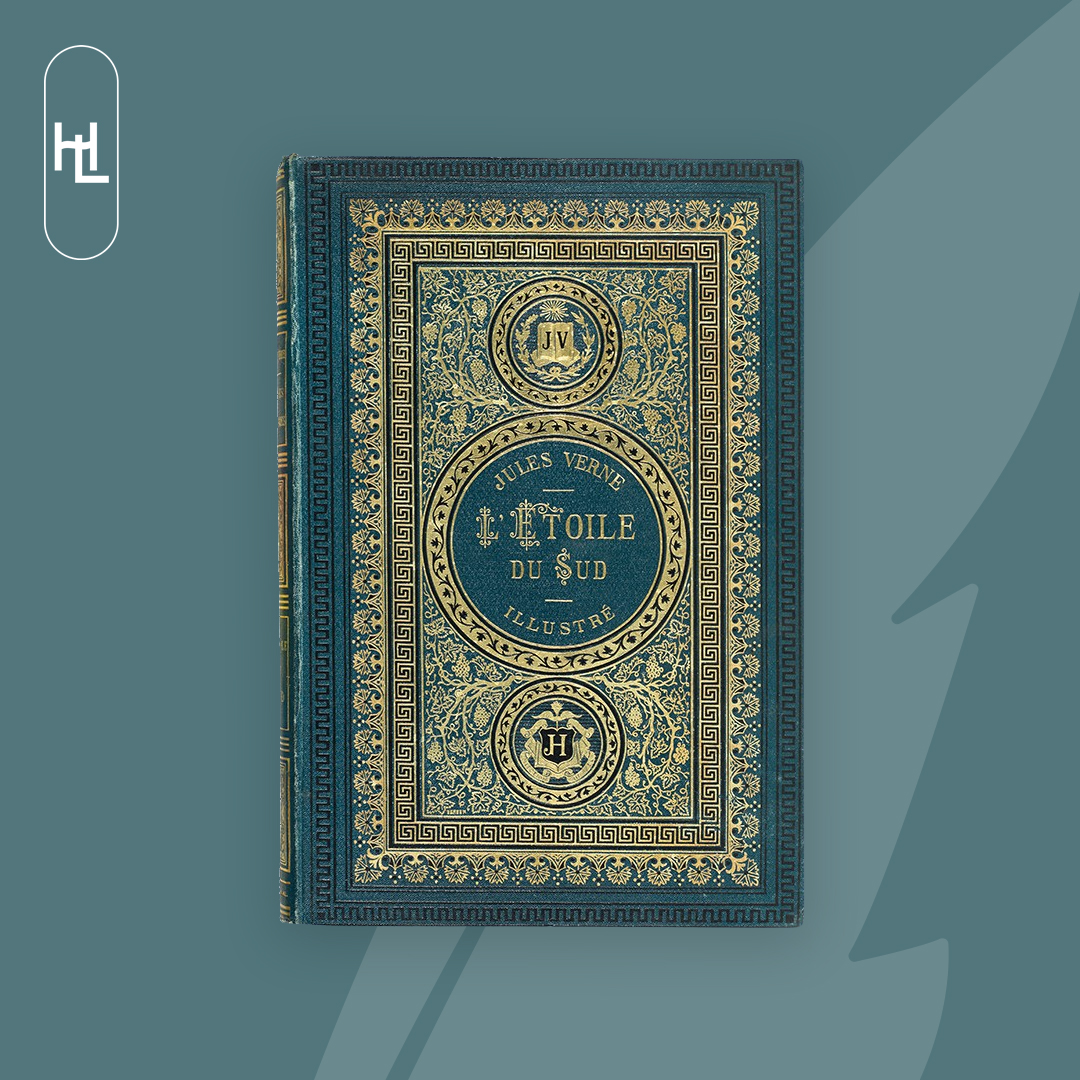
 L’Étoile du sud. Le Pays des diamants, Jules Verne, Paris, Bibliothèque d’éducation et de récréation J. Hetzel et cie, 1884. Première édition illustrée et premier cartonnage. Volume simple, type aux initiales J.V. et J.H. (1875 – 1890) Illustrations Léon Benett, 60 dessins et une carte. Dans le médaillon supérieur des initiales JV, un livre entouré de laurier symbolise le couronnement par l’Académie française des œuvres de Jules Verne. Dans le médaillon inférieur, un H entrelacé d’un J fait référence à l’éditeur Hetzel. Le fond du premier plat représente des ceps de vigne avec des feuilles et des grappes de raisins ; le tout est entouré par une grecque. Dessin Berger. Reliure Magnier.
L’Étoile du sud. Le Pays des diamants, Jules Verne, Paris, Bibliothèque d’éducation et de récréation J. Hetzel et cie, 1884. Première édition illustrée et premier cartonnage. Volume simple, type aux initiales J.V. et J.H. (1875 – 1890) Illustrations Léon Benett, 60 dessins et une carte. Dans le médaillon supérieur des initiales JV, un livre entouré de laurier symbolise le couronnement par l’Académie française des œuvres de Jules Verne. Dans le médaillon inférieur, un H entrelacé d’un J fait référence à l’éditeur Hetzel. Le fond du premier plat représente des ceps de vigne avec des feuilles et des grappes de raisins ; le tout est entouré par une grecque. Dessin Berger. Reliure Magnier.
© Hôtel Littéraire Jules Verne.
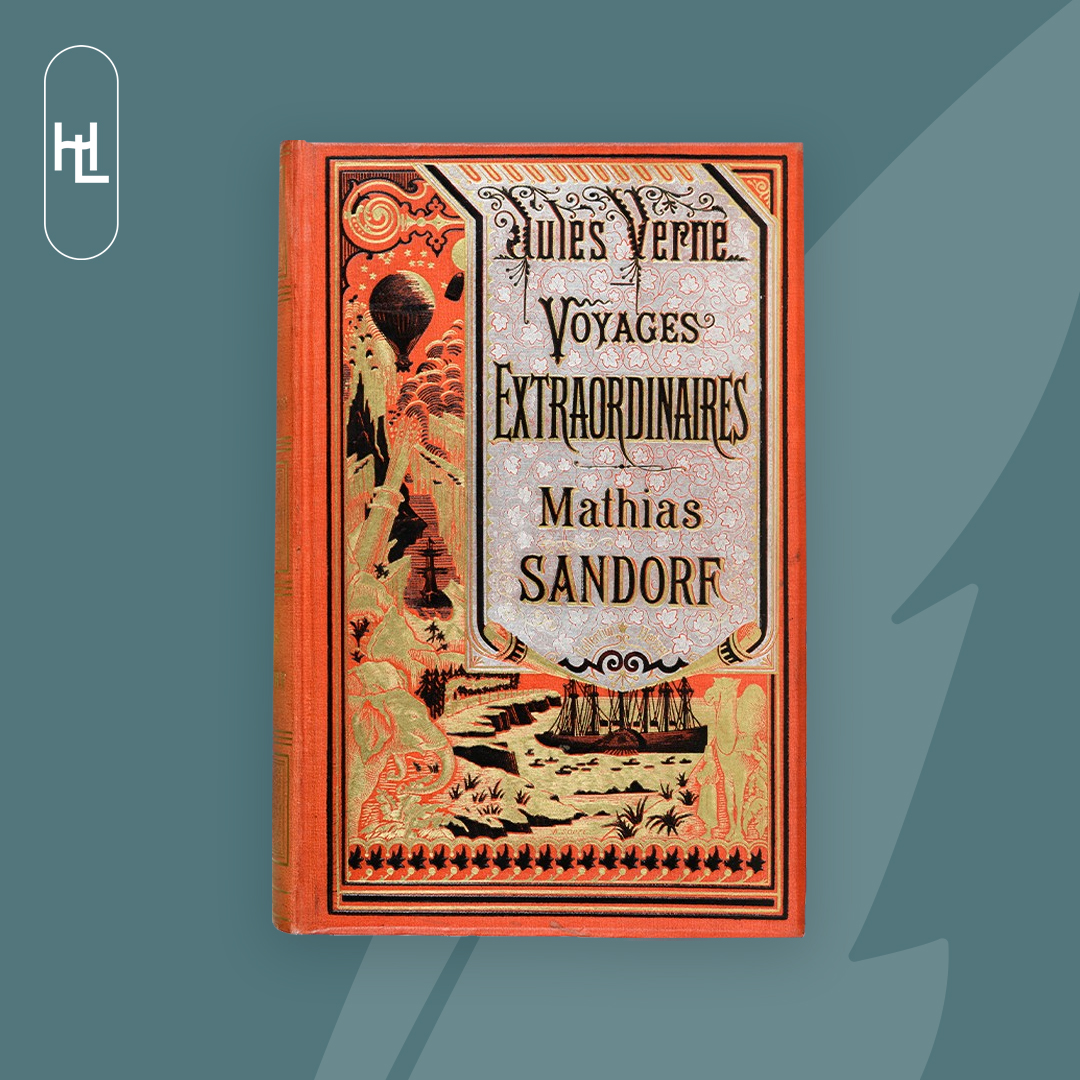
 Mathias Sandorf, Jules Verne, Paris, J. Hetzel et Cie, Bibliothèque d’éducation et de Récréation. Les Voyages Extraordinaires, 1885 In-8. Grd. in 8 (18×27,5cm). Première édition illustrée de 111 dessins par Benett et d’une carte. Cartonnage éditeur. Type au ballon bicolore, dit aussi “à la bannière”. Le titre est inscrit dans une bannière de couleur argentée, ce qui est le cas seulement pour le volume triple de Mathias Sandorf. Le sujet du premier plat représente des éléments tirés des ouvrages déjà publiés comme ballon, icebergs, éléphants et chameaux, bateau. Le sujet tient environ 1/3 de la surface. Le reste est occupé par une grande bannière rectangulaire de couleur argent, qui porte le titre de l’ouvrage. Relié par Lenègre ; plaque spéciale par Souzé.
Mathias Sandorf, Jules Verne, Paris, J. Hetzel et Cie, Bibliothèque d’éducation et de Récréation. Les Voyages Extraordinaires, 1885 In-8. Grd. in 8 (18×27,5cm). Première édition illustrée de 111 dessins par Benett et d’une carte. Cartonnage éditeur. Type au ballon bicolore, dit aussi “à la bannière”. Le titre est inscrit dans une bannière de couleur argentée, ce qui est le cas seulement pour le volume triple de Mathias Sandorf. Le sujet du premier plat représente des éléments tirés des ouvrages déjà publiés comme ballon, icebergs, éléphants et chameaux, bateau. Le sujet tient environ 1/3 de la surface. Le reste est occupé par une grande bannière rectangulaire de couleur argent, qui porte le titre de l’ouvrage. Relié par Lenègre ; plaque spéciale par Souzé.
© Hôtel Littéraire Jules Verne.
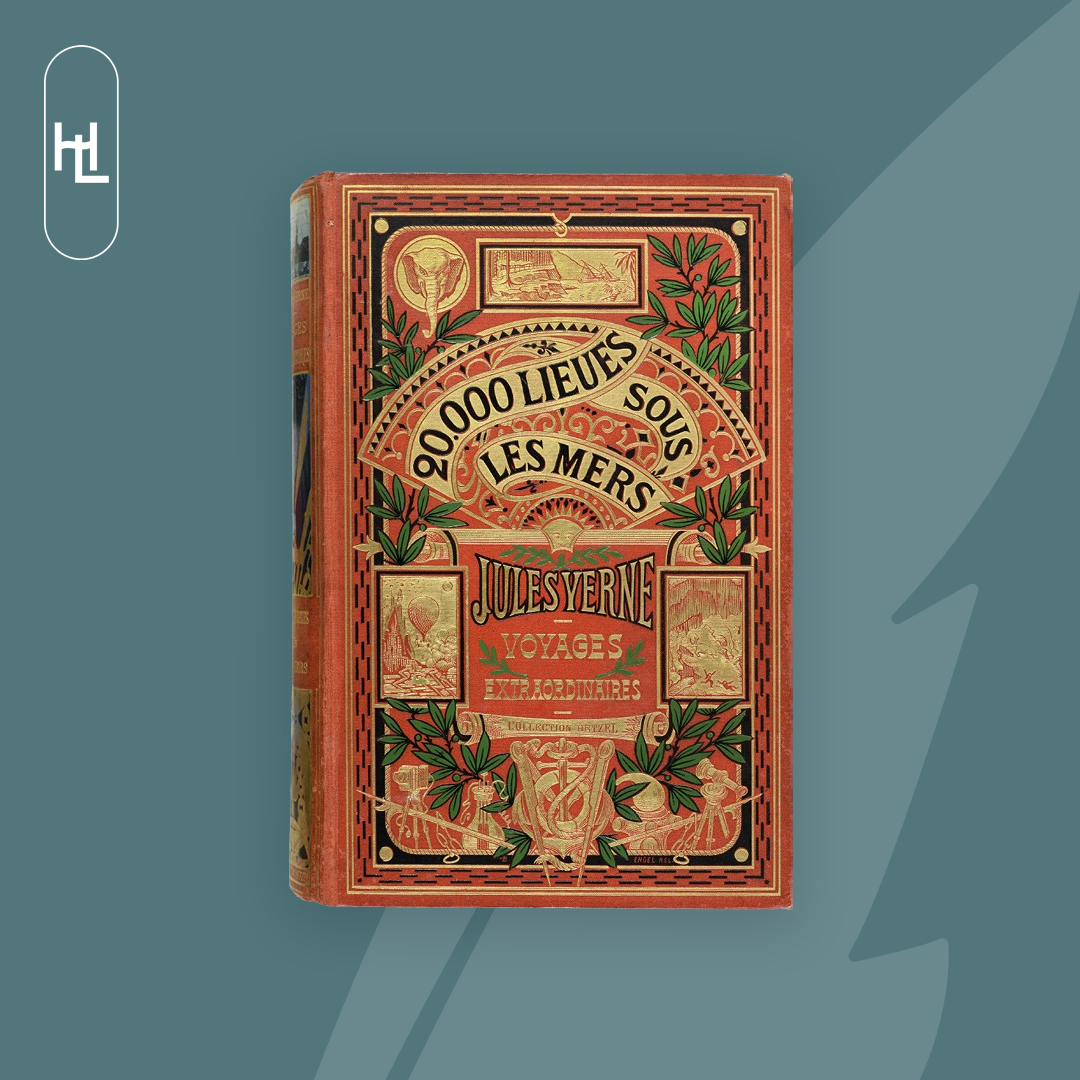

Vingt mille lieues sous les mers, Jules Verne, Paris, Collection Hetzel, sans date [vers 1910]. Illustré de 111 dessins par de Neuville et Riou gravés par Hildibrand. Cartonnage polychrome à un éléphant avec titre dans l’éventail, dos au phare. Le plat « à un éléphant », réalisé entre 1905 et 1919, est un autre type de cartonnage polychrome. Il ressemble beaucoup au motif de la série dite « à deux éléphants », mais un seul éléphant figure maintenant sur la gauche et il y a des feuillages verts sur l’ensemble du plat. Le plat reprend le type aux deux éléphants, mais le motif est très simplifié. Type avec titre dans l’éventail. Il existe un cartonnage personnalisé, légèrement différent pour chaque titre.
© Hôtel Littéraire Jules Verne.
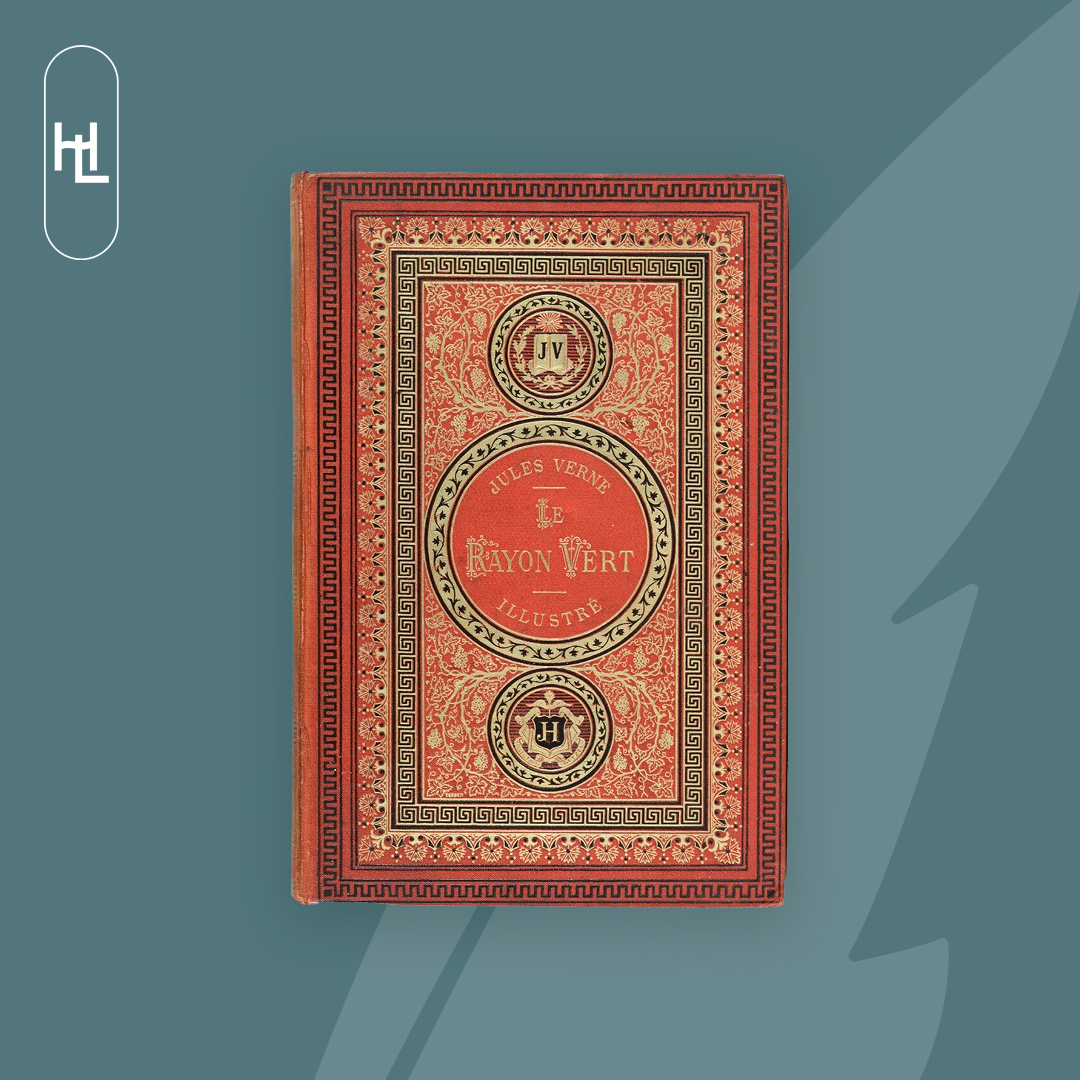
 Le Rayon vert, Jules Verne, Paris, Bibliothèque d’Éducation et de Récréation, J. Hetzel et Cie, sd (1882). Grand in-8 simple, cartonnage éditeur en pleine percaline rouge « aux initiales JV-JH ». Charles Magnier relieur. Première édition illustrée et premier cartonnage simple. 44 illustrations par Léon Benett et une carte. Le plat « aux inititales J.V. et J.H. », réalisé par Hetzel entre 1875 et 1889, est un cartonnage monochrome comportant les initiales JV (pour Jules Verne) dans le médaillon supérieur, et les initiales JH (pour Jules Hetzel) dans le médaillon inférieur.
Le Rayon vert, Jules Verne, Paris, Bibliothèque d’Éducation et de Récréation, J. Hetzel et Cie, sd (1882). Grand in-8 simple, cartonnage éditeur en pleine percaline rouge « aux initiales JV-JH ». Charles Magnier relieur. Première édition illustrée et premier cartonnage simple. 44 illustrations par Léon Benett et une carte. Le plat « aux inititales J.V. et J.H. », réalisé par Hetzel entre 1875 et 1889, est un cartonnage monochrome comportant les initiales JV (pour Jules Verne) dans le médaillon supérieur, et les initiales JH (pour Jules Hetzel) dans le médaillon inférieur.
© Hôtel Littéraire Jules Verne.
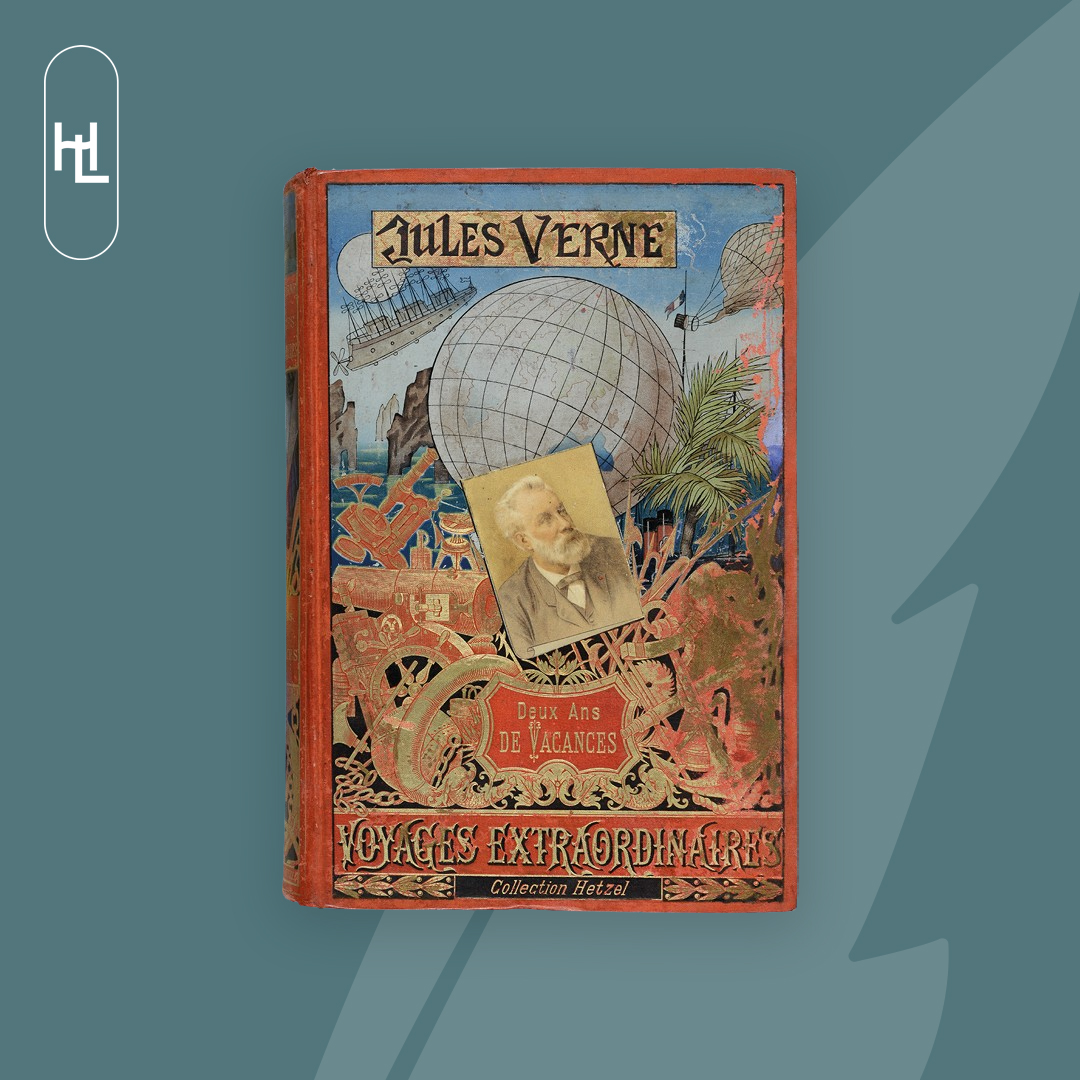
 Deux ans de vacances, Jules Verne, Paris, Bibliothèque d’éducation et de récréation J. Hetzel et cie, sans date [1893]. Grand in-8° relié pleine percaline d’éditeur à décor, cartonnage au portrait collé. 92 illustrations de Léon Benett dont une carte hors-texte en couleurs : il s’agit de la première apparition de la polychromie pour une illustration d’un roman de Jules Verne. Cartonnage polychrome dit « au portrait collé », avec « dos au phare » ; gravure de Paul Souze et A. Lenègre. Le « plat au portrait », réalisé entre 1890 et 1895 par Hetzel, est l’un des types les plus prestigieux, puisqu’il rentre dans la catégorie des cartonnages dits polychromes, avec « dos au phare ».
Deux ans de vacances, Jules Verne, Paris, Bibliothèque d’éducation et de récréation J. Hetzel et cie, sans date [1893]. Grand in-8° relié pleine percaline d’éditeur à décor, cartonnage au portrait collé. 92 illustrations de Léon Benett dont une carte hors-texte en couleurs : il s’agit de la première apparition de la polychromie pour une illustration d’un roman de Jules Verne. Cartonnage polychrome dit « au portrait collé », avec « dos au phare » ; gravure de Paul Souze et A. Lenègre. Le « plat au portrait », réalisé entre 1890 et 1895 par Hetzel, est l’un des types les plus prestigieux, puisqu’il rentre dans la catégorie des cartonnages dits polychromes, avec « dos au phare ».
© Hôtel Littéraire Jules Verne.
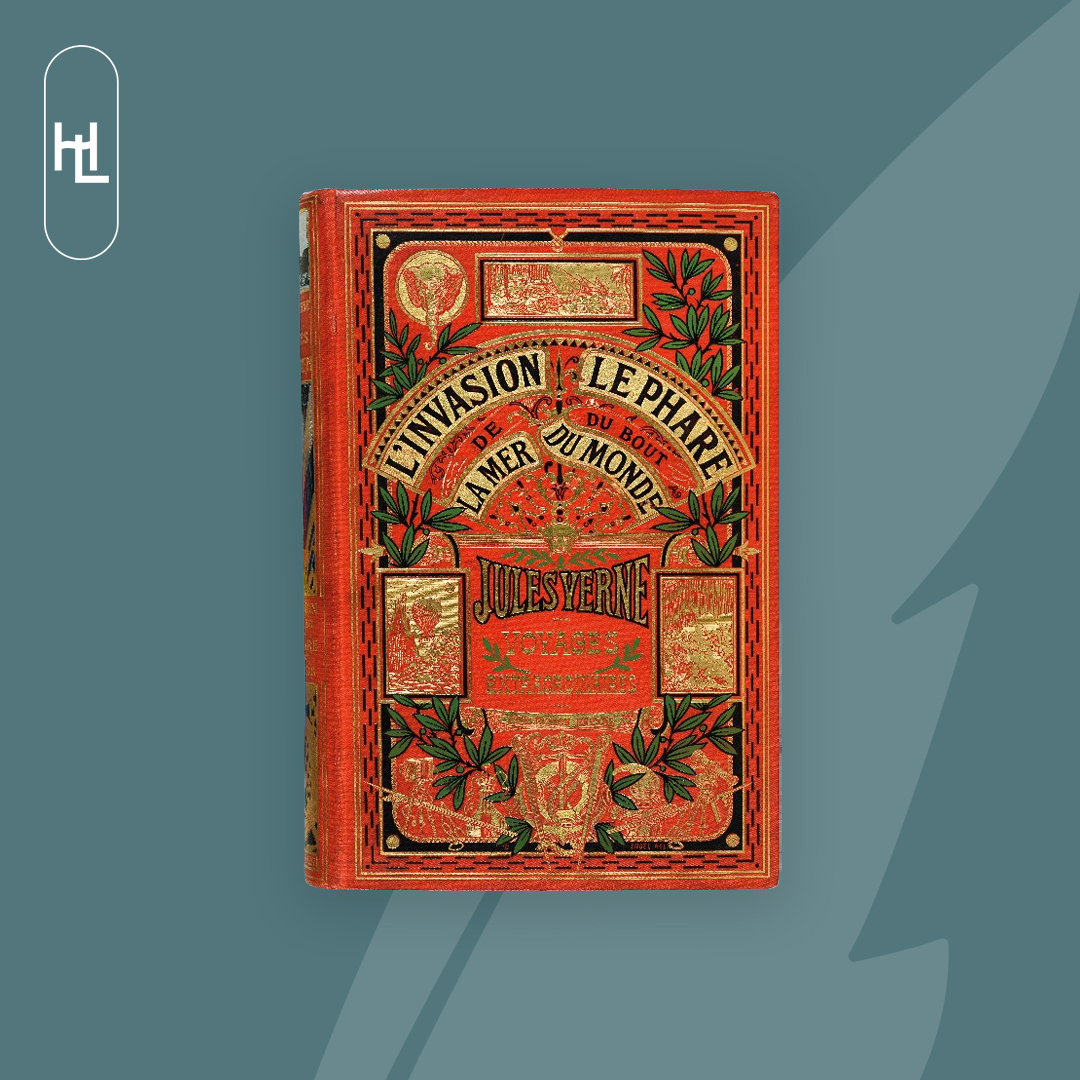
 L’invasion de la mer. Le Phare du bout du monde, Jules Verne, Paris, Collection Hetzel, 1905. Grand in-8 ( 280 X 185 mm ) de 236 et 204 pages. Les voyages extraordinaires. Première et seule édition collective illustrée. C’est le seul cartonnage double avec dos au phare pour ces textes. 12 couleurs de Léon Benett (pour L’Invasion), de George Roux (pour Le Phare). Cartonnage de percaline polychrome de l’éditeur, signé Engel. Premier plat “à un éléphant” avec “titre dans l’éventail”. Ce cartonnage comporte plusieurs sujets encadrés dans des rectangles. On y voit une scène de glaces tirée du Pays des fourrures, le Great Eastern, un ballon. L’ensemble du motif est imprimé en doré sur le fond de couleur de la toile.
L’invasion de la mer. Le Phare du bout du monde, Jules Verne, Paris, Collection Hetzel, 1905. Grand in-8 ( 280 X 185 mm ) de 236 et 204 pages. Les voyages extraordinaires. Première et seule édition collective illustrée. C’est le seul cartonnage double avec dos au phare pour ces textes. 12 couleurs de Léon Benett (pour L’Invasion), de George Roux (pour Le Phare). Cartonnage de percaline polychrome de l’éditeur, signé Engel. Premier plat “à un éléphant” avec “titre dans l’éventail”. Ce cartonnage comporte plusieurs sujets encadrés dans des rectangles. On y voit une scène de glaces tirée du Pays des fourrures, le Great Eastern, un ballon. L’ensemble du motif est imprimé en doré sur le fond de couleur de la toile.
© Hôtel Littéraire Jules Verne.
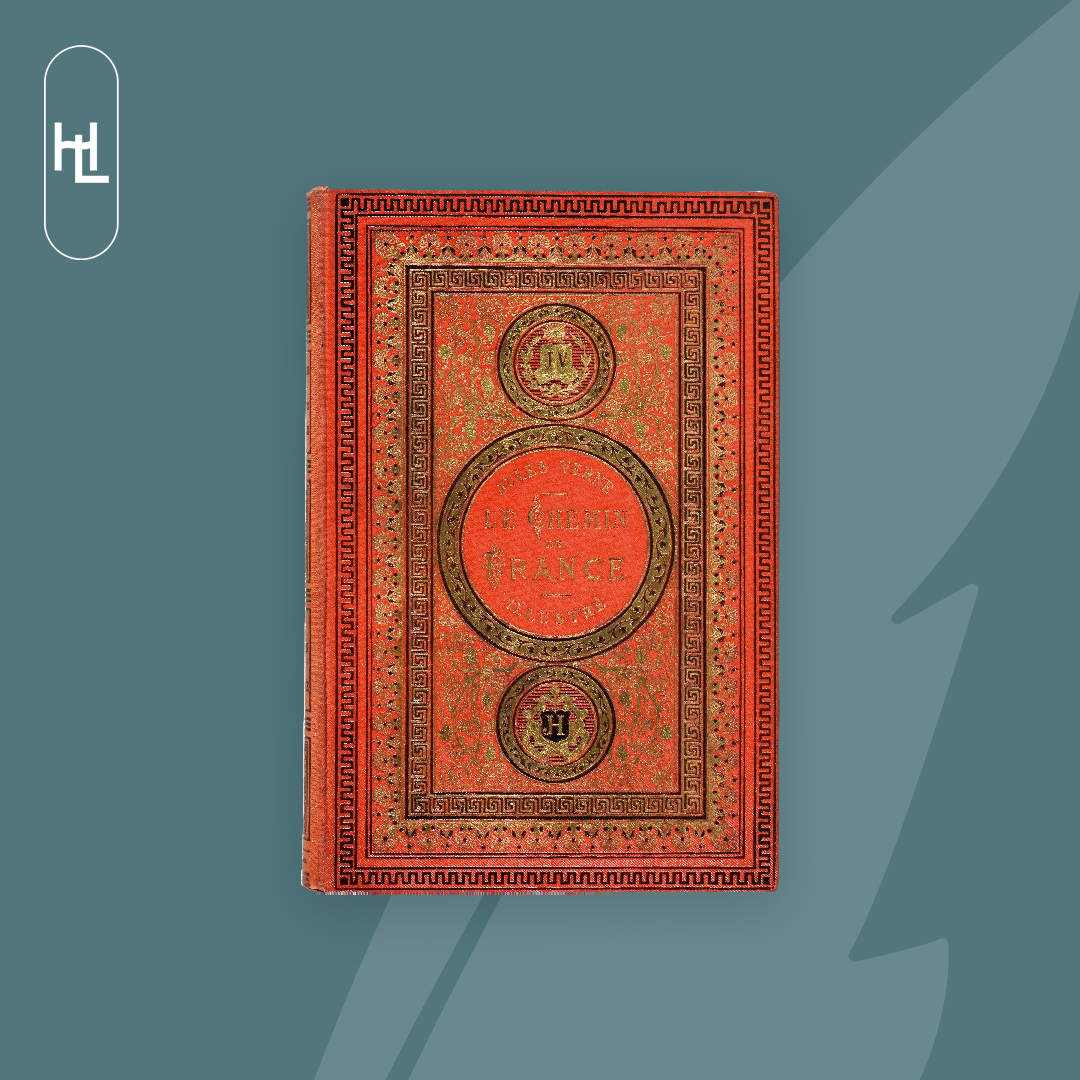
 Le Chemin de France, Jules Verne, Paris, Bibliothèque d’Éducation et de Récréation J. Hetzel, 1887. Grand in-8° simple. Cartonnage éditeur en pleine percaline rouge « aux initiales JV-JH ». Première édition illustrée et premier cartonnage. 41 dessins par Georges Roux et 2 cartes. Cartonnage monochrome, édité de 1875 à 1890, appelé « aux initiales JV – JH » car comportant les initiales JV (pour Jules Verne) dans le médaillon supérieur, et les initiales JH (pour Jules Hetzel) dans le médaillon inférieur.
Le Chemin de France, Jules Verne, Paris, Bibliothèque d’Éducation et de Récréation J. Hetzel, 1887. Grand in-8° simple. Cartonnage éditeur en pleine percaline rouge « aux initiales JV-JH ». Première édition illustrée et premier cartonnage. 41 dessins par Georges Roux et 2 cartes. Cartonnage monochrome, édité de 1875 à 1890, appelé « aux initiales JV – JH » car comportant les initiales JV (pour Jules Verne) dans le médaillon supérieur, et les initiales JH (pour Jules Hetzel) dans le médaillon inférieur.
© Hôtel Littéraire Jules Verne.
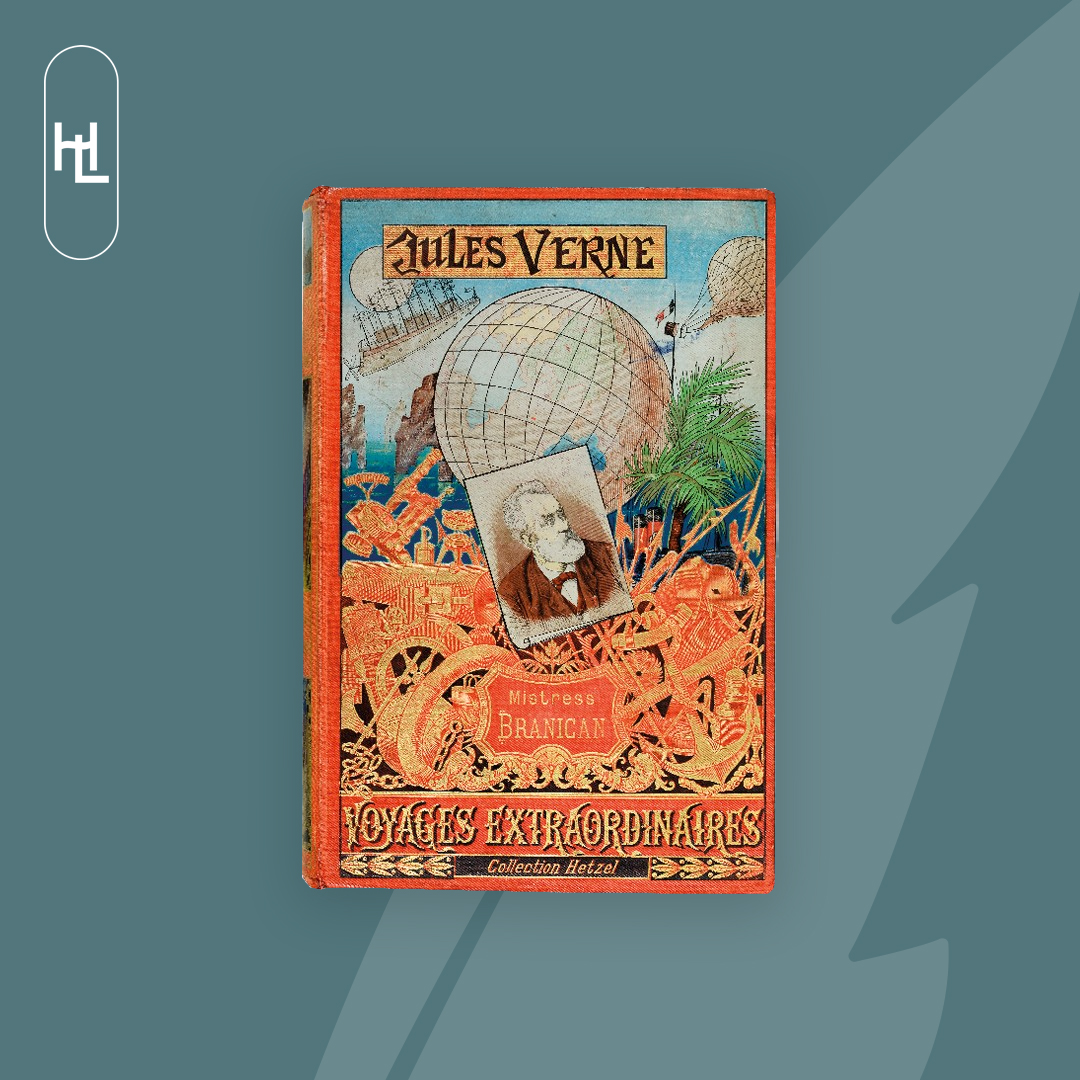
 Mistress Branican, Jules Verne, Hetzel, Paris 1891. Première édition in-8 ornée d’illustrations de Léon Benett et de deux grandes cartes. Premier cartonnage Hetzel “au portrait imprimé” en pleine percaline rouge signé A. Lenègre. Ce titre inaugure la série des cartonnages polychromes avec “dos au phare”. Dos au phare, pages de garde bleues d’origine, toutes tranches dorées. Sur le centre du plat, on reconnaît un portrait de l’auteur, entouré de deux motifs en couleurs, le vaisseau volant de Robur et le ballon de Cinq semaines en ballon, surplombant un globe terrestre. Les cartonnages au “portrait imprimé” seront abandonnés dès l’année suivante pour le type “au portrait collé”.
Mistress Branican, Jules Verne, Hetzel, Paris 1891. Première édition in-8 ornée d’illustrations de Léon Benett et de deux grandes cartes. Premier cartonnage Hetzel “au portrait imprimé” en pleine percaline rouge signé A. Lenègre. Ce titre inaugure la série des cartonnages polychromes avec “dos au phare”. Dos au phare, pages de garde bleues d’origine, toutes tranches dorées. Sur le centre du plat, on reconnaît un portrait de l’auteur, entouré de deux motifs en couleurs, le vaisseau volant de Robur et le ballon de Cinq semaines en ballon, surplombant un globe terrestre. Les cartonnages au “portrait imprimé” seront abandonnés dès l’année suivante pour le type “au portrait collé”.
© Hôtel Littéraire Jules Verne.
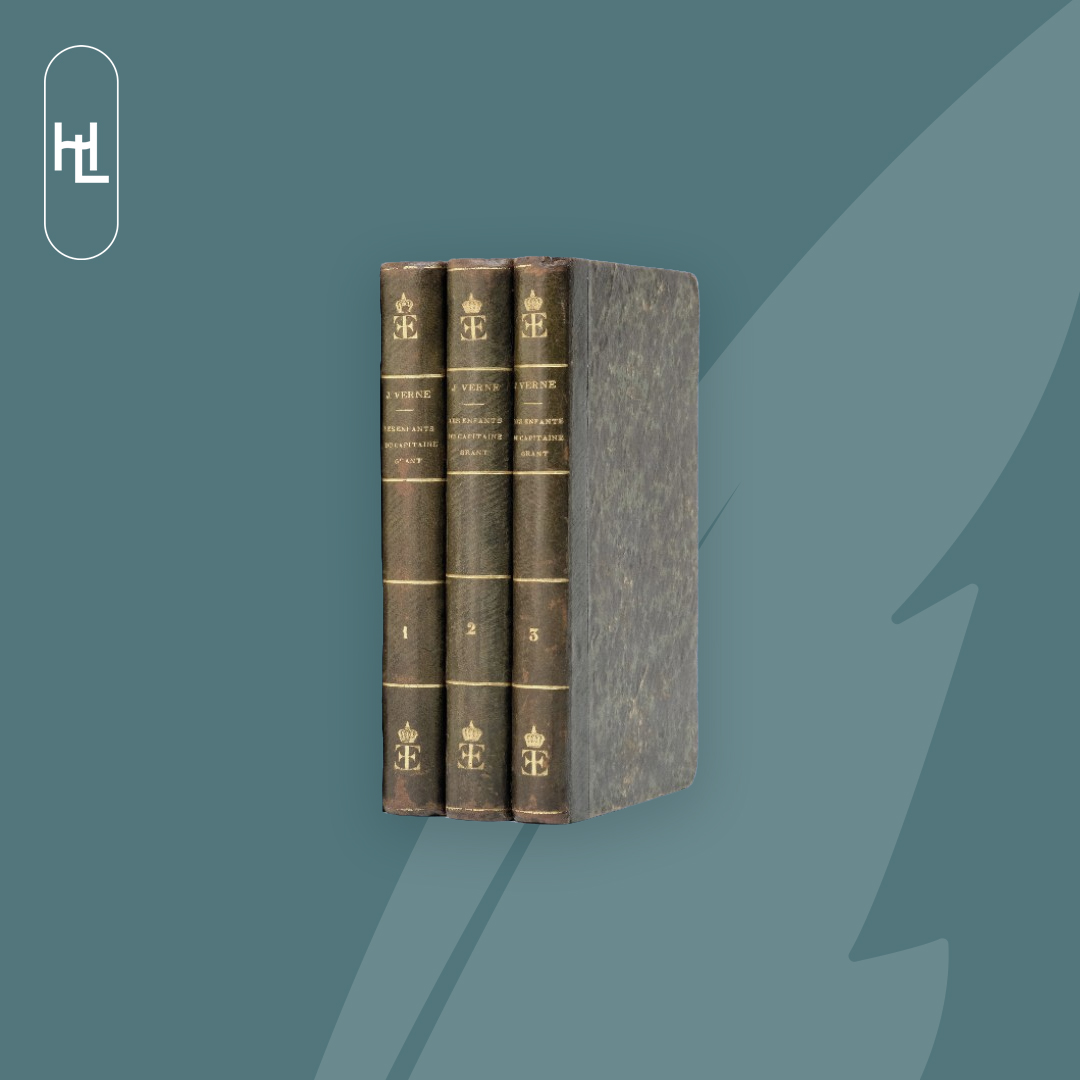
 Les Enfants du Capitaine Grant. Jules Verne. Paris, Bibliothèque d’éducation et de récréation J. Hetzel, 1867-1868. 3 tomes. Illustrations d’Edouard Riou (1833-1900). Les Enfants du Capitaine Grant, Jules Verne, trois volumes en édition originale dans la Bibliothèque d’éducation et de récréation de Pierre-Jules Hetzel, 1867-68, et ayant appartenu à l’épouse de Napoléon III. Reliure en demi-basane verte maroquinée avec un dos lisse orné du même chiffre couronné en pied et en queue : celui de l’impératrice Eugénie. Ilustrations de Riou. Compte-tenu du format des livres, des petits in-18° qui ne ressemblent pas encore à ce que seront les grands cartonnages Hetzel (in-8°), on peut imaginer qu’ils provenaient d’une bibliothèque de campagne ou de sa bibliothèque de voyage. Or l’impératrice fit au moins treize séjours longs à Biarritz – dont le dernier en 1869.
Les Enfants du Capitaine Grant. Jules Verne. Paris, Bibliothèque d’éducation et de récréation J. Hetzel, 1867-1868. 3 tomes. Illustrations d’Edouard Riou (1833-1900). Les Enfants du Capitaine Grant, Jules Verne, trois volumes en édition originale dans la Bibliothèque d’éducation et de récréation de Pierre-Jules Hetzel, 1867-68, et ayant appartenu à l’épouse de Napoléon III. Reliure en demi-basane verte maroquinée avec un dos lisse orné du même chiffre couronné en pied et en queue : celui de l’impératrice Eugénie. Ilustrations de Riou. Compte-tenu du format des livres, des petits in-18° qui ne ressemblent pas encore à ce que seront les grands cartonnages Hetzel (in-8°), on peut imaginer qu’ils provenaient d’une bibliothèque de campagne ou de sa bibliothèque de voyage. Or l’impératrice fit au moins treize séjours longs à Biarritz – dont le dernier en 1869.
© Hôtel Littéraire Jules Verne
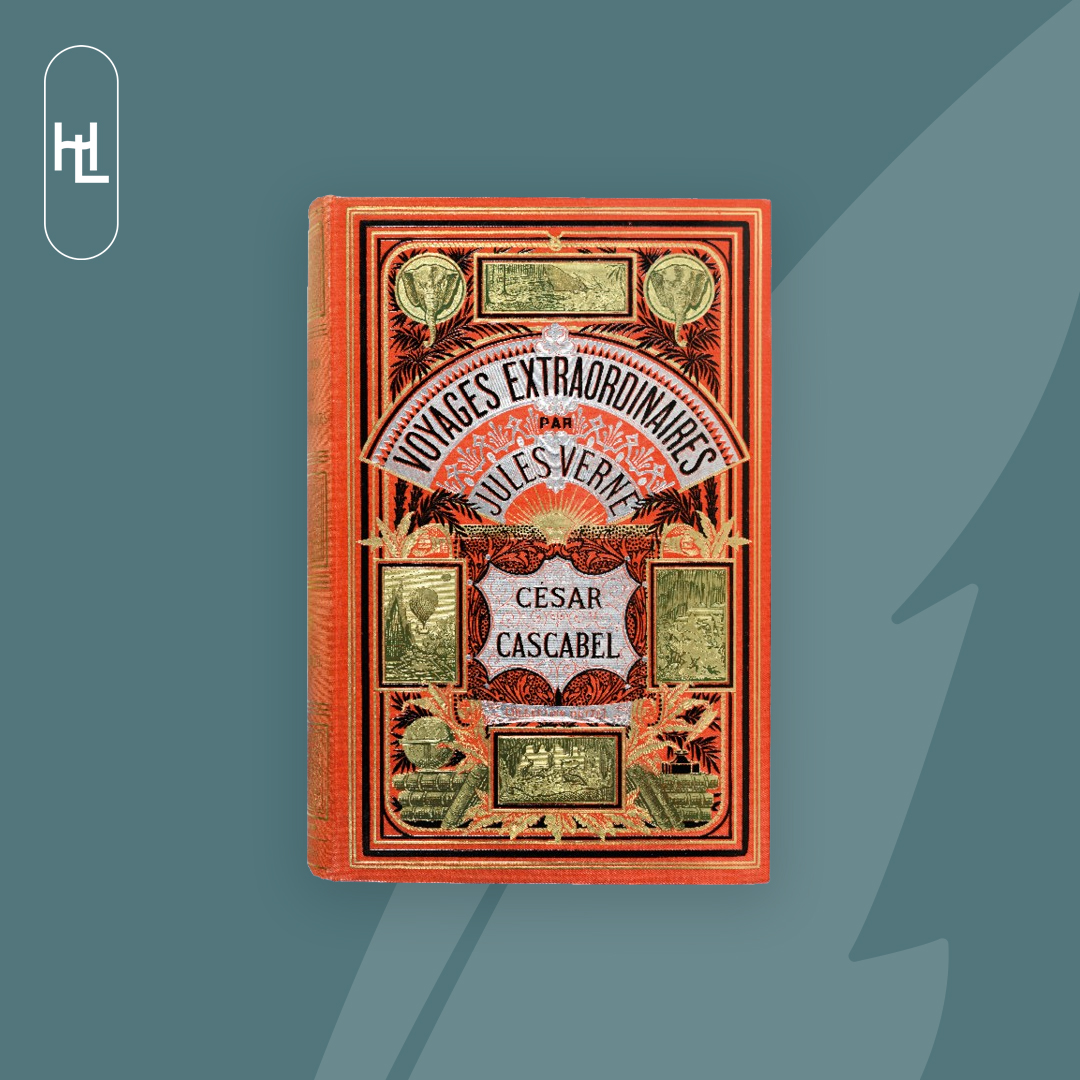

César Cascabel. Jules Verne. Paris, Hetzel, [1890]. Cartonnage aux deux éléphants sur fond rouge de type spécial, au plat argenté et vert sous ors.
© Hôtel Littéraire Jules Verne.
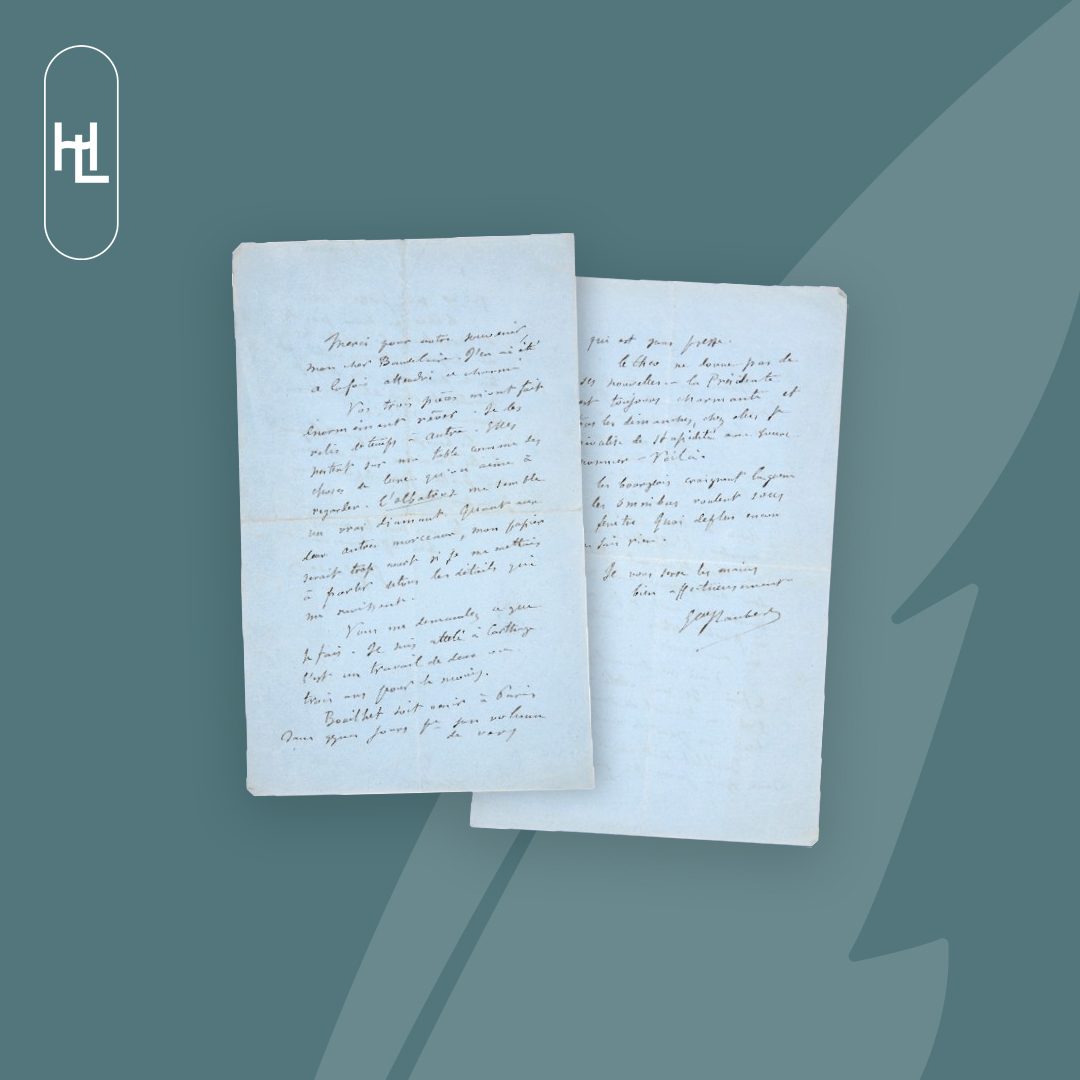
 Lettre de Flaubert à Baudelaire. Paris, 1859. On ne connaît que 9 lettres de Flaubert adressées à Baudelaire et 5 du poète au romancier, écrites entre le 13 juillet 1857 et le 3 février 1862. Lettre de Gustave Flaubert à Charles Baudelaire, écrite à Paris le 19/02/1859 et dont voici la retranscription : “Merci pour votre souvenir, mon cher Baudelaire. J’en ai été à la fois attendri et charmé. Vos trois pièces m’ont fait énormément rêver. Je les relis de temps à autre. Elles restent sur ma table comme des choses de luxe qu’on aime à regarder. L’albatros me semble un vrai diamant. Quant aux deux autres morceaux, mon papier serait trop court si je me mettais à vous parler de tous les détails qui me ravissent. Vous me demandez ce que je fais. Je suis attelé à Carthage. C’est un travail de deux ou trois ans pour le moins. Bouilhet doit venir à Paris dans quelques jours pour son volume de vers qui est sous presse. Le Théo ne donne pas de ses nouvelles.– La Présidente est toujours charmante, et tous les dimanches, chez elle, je rivalise de stupidité avec Henri Monnier. Voilà. Les bourgeois craignent la guerre & les omnibus roulent sous ma fenêtre. Quoi de plus encore. Je ne sais rien. Je vous serre les mains bien affectueusement. Gve Flaubert”
Lettre de Flaubert à Baudelaire. Paris, 1859. On ne connaît que 9 lettres de Flaubert adressées à Baudelaire et 5 du poète au romancier, écrites entre le 13 juillet 1857 et le 3 février 1862. Lettre de Gustave Flaubert à Charles Baudelaire, écrite à Paris le 19/02/1859 et dont voici la retranscription : “Merci pour votre souvenir, mon cher Baudelaire. J’en ai été à la fois attendri et charmé. Vos trois pièces m’ont fait énormément rêver. Je les relis de temps à autre. Elles restent sur ma table comme des choses de luxe qu’on aime à regarder. L’albatros me semble un vrai diamant. Quant aux deux autres morceaux, mon papier serait trop court si je me mettais à vous parler de tous les détails qui me ravissent. Vous me demandez ce que je fais. Je suis attelé à Carthage. C’est un travail de deux ou trois ans pour le moins. Bouilhet doit venir à Paris dans quelques jours pour son volume de vers qui est sous presse. Le Théo ne donne pas de ses nouvelles.– La Présidente est toujours charmante, et tous les dimanches, chez elle, je rivalise de stupidité avec Henri Monnier. Voilà. Les bourgeois craignent la guerre & les omnibus roulent sous ma fenêtre. Quoi de plus encore. Je ne sais rien. Je vous serre les mains bien affectueusement. Gve Flaubert”
© Hôtel Littéraire Gustave Flaubert.
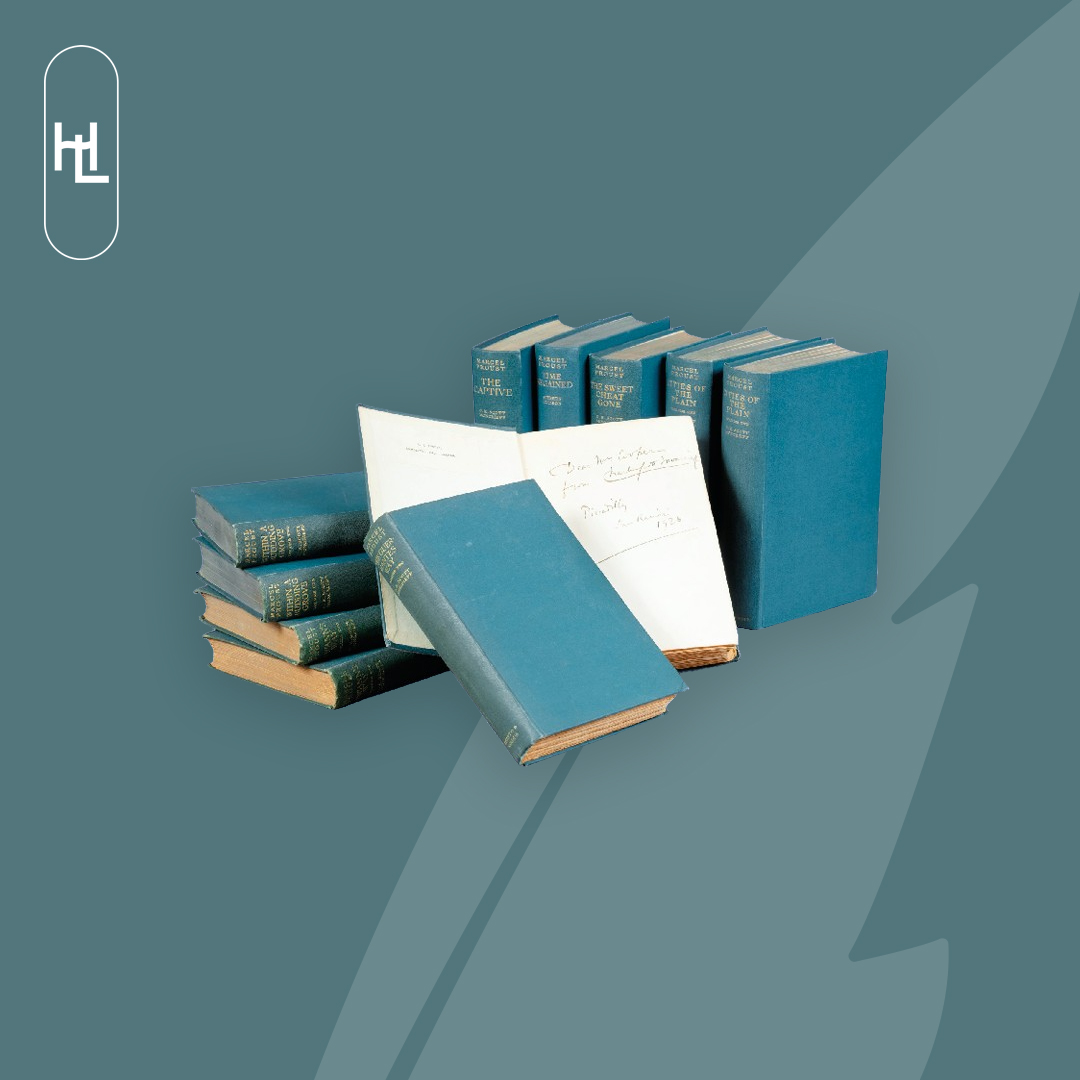
 A la recherche du temps perdu. Marcel Proust. Editée à Londres par Chatto & Windus puis chez Alfred A. Knopff, entre 1922 et 1931. 11 volumes in-8 en percaline bleue de l’éditeur, dos lisse, titre doré, tête bleue. Le tirage des 5 derniers volumes sont sur papier vergé ; les volumes de Cities of the Plain (I) et The Time regained sont numérotés. Remembrance of Things Past, édition originale anglaise de À la recherche du temps perdu de M. Proust, Londres, chez Chatto & Windus, puis chez Alfred A. Knopff, entre 1922 et 1931, 11 volumes in-8 en percaline bleue de l’éditeur, dos lisse, titre doré, tête bleue. Le tirage des 5 derniers volumes sont sur papier vergé ; les volumes de Cities of the Plain (I) et The Time regained sont numérotés. C’est la 1ere traduction qui a été faite de La Recherche en langue anglaise. Elle est l’œuvre de l’Écossais C. K. S. Moncrieff (1889−1930) qui ne put l’achever avant sa mort. Aussi le dernier tome, The Time regained a-t-il été traduit par S. Schiff, correspondant et admirateur de Proust. Cette édition originale a appartenu à la collection d’un grand bibliophile et d’un grand proustien Hubert Heilbronn. Elle vient du château de Hambleton Hall dont elle porte l’ex-libris : “Hambleton Hall, Oakham”, ainsi qu’un envoi de Scott Moncrieff au propriétaire :“Dear Mr Cooper / from Charles Scott Moncriff / Piccadilly / San Ranieri 1926.
A la recherche du temps perdu. Marcel Proust. Editée à Londres par Chatto & Windus puis chez Alfred A. Knopff, entre 1922 et 1931. 11 volumes in-8 en percaline bleue de l’éditeur, dos lisse, titre doré, tête bleue. Le tirage des 5 derniers volumes sont sur papier vergé ; les volumes de Cities of the Plain (I) et The Time regained sont numérotés. Remembrance of Things Past, édition originale anglaise de À la recherche du temps perdu de M. Proust, Londres, chez Chatto & Windus, puis chez Alfred A. Knopff, entre 1922 et 1931, 11 volumes in-8 en percaline bleue de l’éditeur, dos lisse, titre doré, tête bleue. Le tirage des 5 derniers volumes sont sur papier vergé ; les volumes de Cities of the Plain (I) et The Time regained sont numérotés. C’est la 1ere traduction qui a été faite de La Recherche en langue anglaise. Elle est l’œuvre de l’Écossais C. K. S. Moncrieff (1889−1930) qui ne put l’achever avant sa mort. Aussi le dernier tome, The Time regained a-t-il été traduit par S. Schiff, correspondant et admirateur de Proust. Cette édition originale a appartenu à la collection d’un grand bibliophile et d’un grand proustien Hubert Heilbronn. Elle vient du château de Hambleton Hall dont elle porte l’ex-libris : “Hambleton Hall, Oakham”, ainsi qu’un envoi de Scott Moncrieff au propriétaire :“Dear Mr Cooper / from Charles Scott Moncriff / Piccadilly / San Ranieri 1926.
© Hôtel Littéraire Le Swann
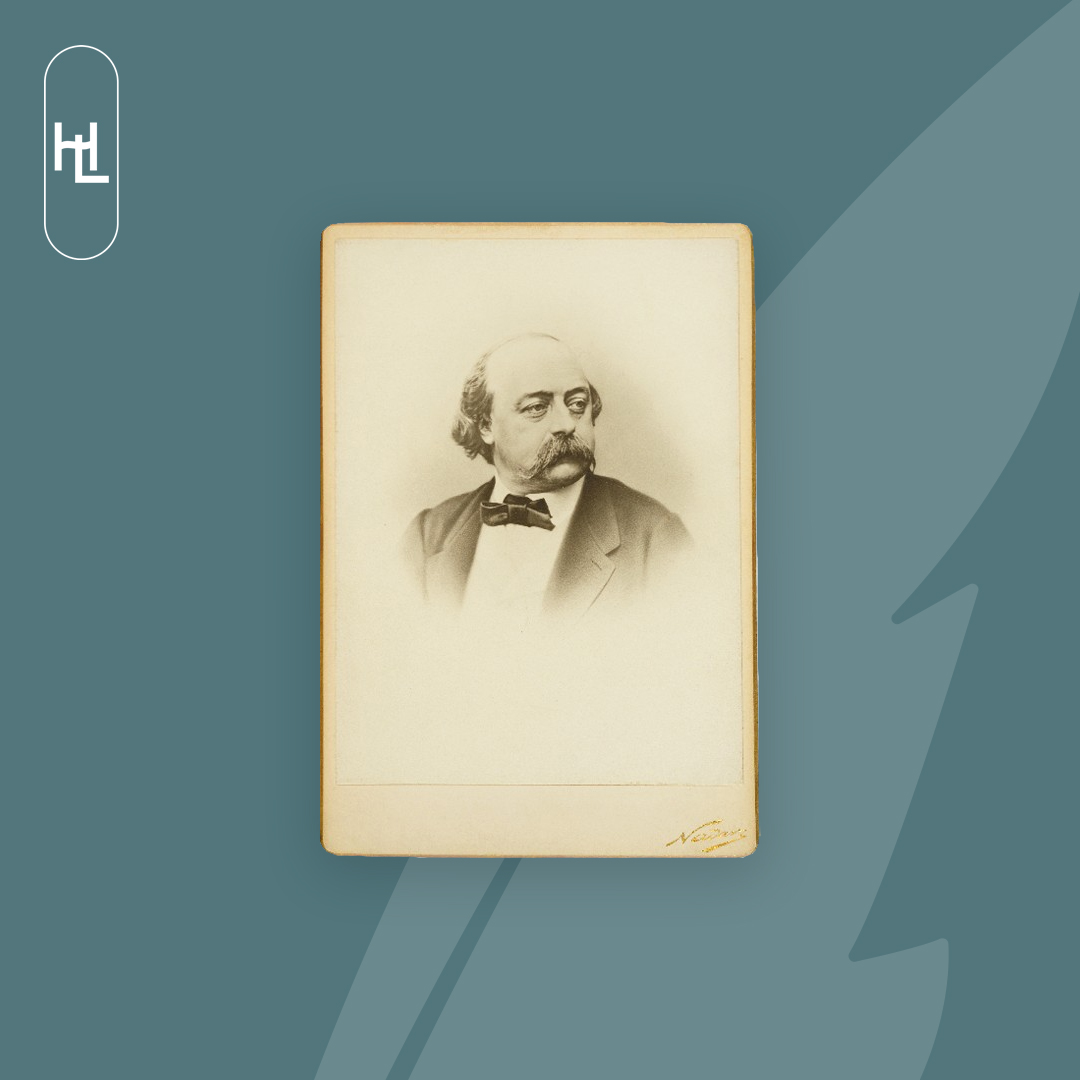
 Photographie de Gustave Flaubert par Nadar, dont la prise de vue eut lieu en studio entre 1862 et 1869 (?), et portant la signature du photographe. La mention imprimée “Médaille d’or. Exposition universelle, 1878” apparaît au dos du tirage ainsi qu’un tampon indiquant “collection Claude Buffet”. Claude Buffet, libraire parisien, était lui-même le frère du peintre Bernard Buffet. Si dans la seconde moitié du XIXe siècle, les portraits photographiques d’écrivains sont omniprésents dans la presse, Gustave Flaubert refusera toute sa vie de se livrer à cette forme de publicité et ne partagera pour sa part les rares images de lui qu’à la sphère intime de ses amis.
Photographie de Gustave Flaubert par Nadar, dont la prise de vue eut lieu en studio entre 1862 et 1869 (?), et portant la signature du photographe. La mention imprimée “Médaille d’or. Exposition universelle, 1878” apparaît au dos du tirage ainsi qu’un tampon indiquant “collection Claude Buffet”. Claude Buffet, libraire parisien, était lui-même le frère du peintre Bernard Buffet. Si dans la seconde moitié du XIXe siècle, les portraits photographiques d’écrivains sont omniprésents dans la presse, Gustave Flaubert refusera toute sa vie de se livrer à cette forme de publicité et ne partagera pour sa part les rares images de lui qu’à la sphère intime de ses amis.
© Hôtel Littéraire Gustave Flaubert.
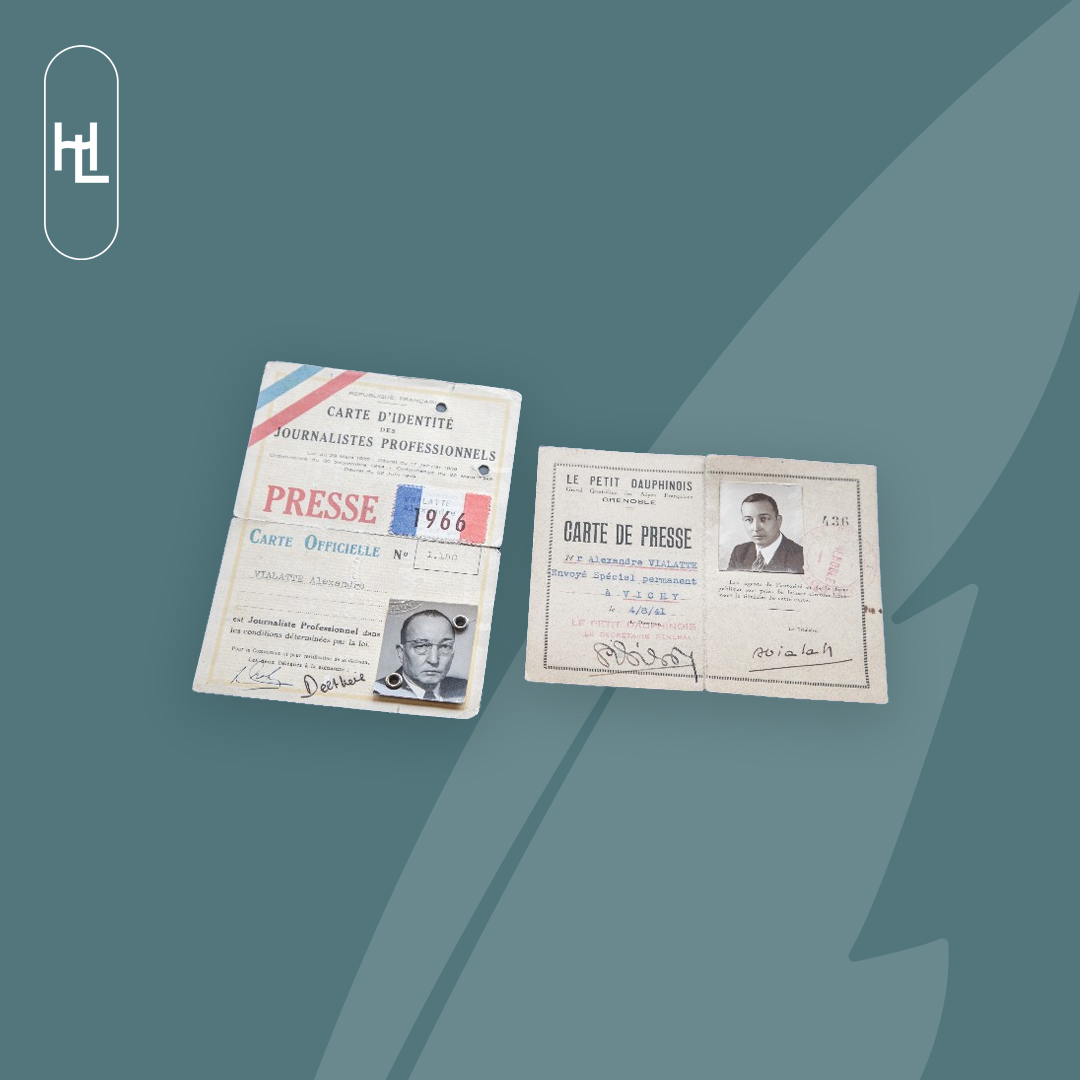
 Deux cartes de presse ayant appartenu à Alexandre Vialatte. L’une fut éditée en 1941 par le Petit Dauphinois. Elle porte la mention “envoyé spécial permanent à Vichy”, le numéro 436, et la signature autographe d’Alexandre Vialatte sous sa photo d’identité. La seconde est la carte de presse officiellement délivrée à son nom par la République française pour l’année 1966. Elle indique le numéro 1.150. au-dessus d’une photo d’identité, sur laquelle, il porte à la différence de la première, des lunettes. Ces deux cartes de presse furent généreusement offertes à l’Hôtel Littéraire Alexandre Vialatte en 2016 par son fils Pierre Vialatte (1930-2020), qui contribua lui-même toute sa vie au rayonnement de l’œuvre de son père, non seulement comme chroniqueur mais aussi comme romancier et traducteur.
Deux cartes de presse ayant appartenu à Alexandre Vialatte. L’une fut éditée en 1941 par le Petit Dauphinois. Elle porte la mention “envoyé spécial permanent à Vichy”, le numéro 436, et la signature autographe d’Alexandre Vialatte sous sa photo d’identité. La seconde est la carte de presse officiellement délivrée à son nom par la République française pour l’année 1966. Elle indique le numéro 1.150. au-dessus d’une photo d’identité, sur laquelle, il porte à la différence de la première, des lunettes. Ces deux cartes de presse furent généreusement offertes à l’Hôtel Littéraire Alexandre Vialatte en 2016 par son fils Pierre Vialatte (1930-2020), qui contribua lui-même toute sa vie au rayonnement de l’œuvre de son père, non seulement comme chroniqueur mais aussi comme romancier et traducteur.
© Hôtel Littéraire Alexandre Vialatte.
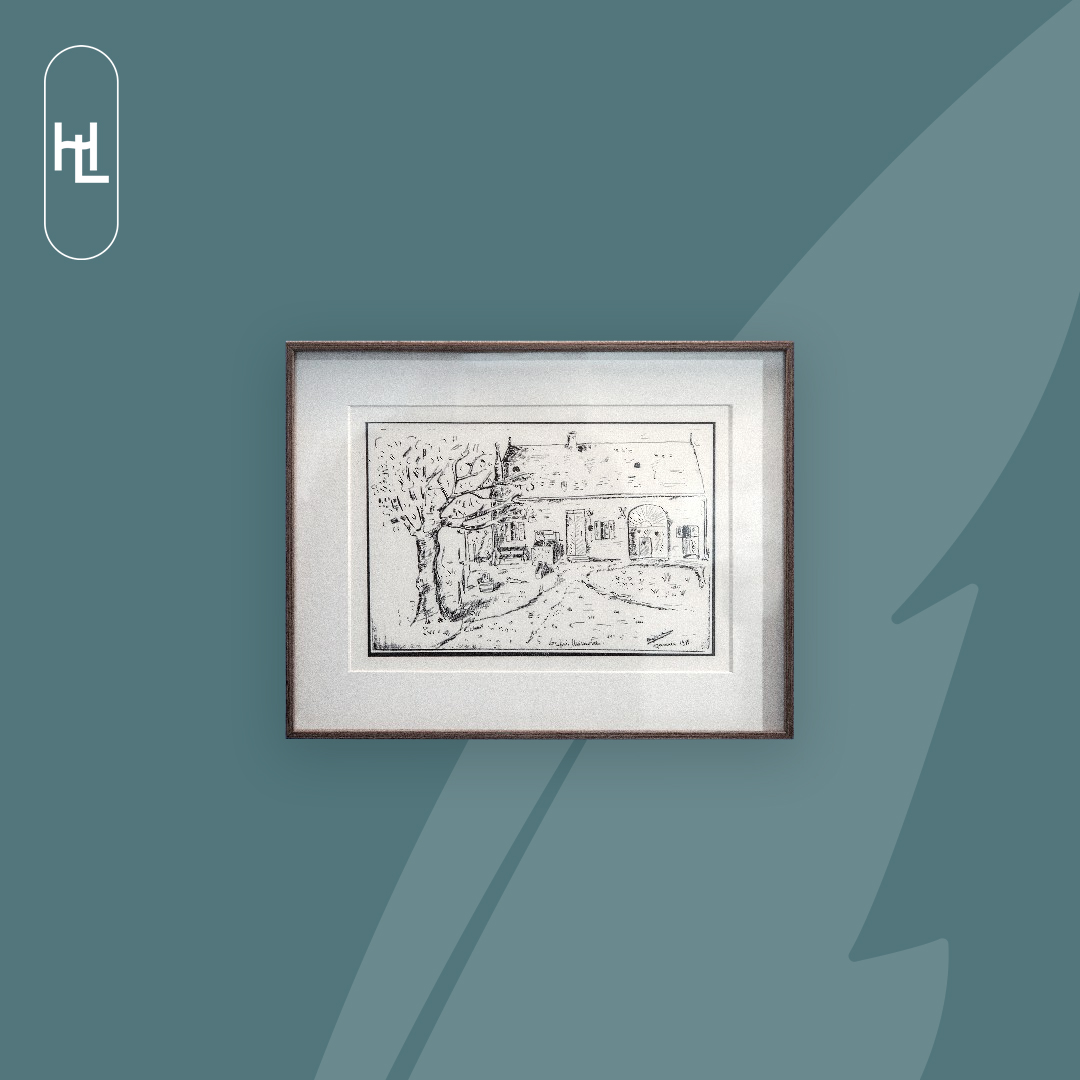
 Reproduction d’un dessin exécuté d’après mémoire par Marcel Aymé en 1915 et représentant la maison des grands-parents maternels de l’écrivain, “La Tuilerie”, où il vécut à Villers-Robert, depuis la mort de sa mère en 1904 jusqu’en 1910. Son grand-père Auguste Monamy, à la fois fermier et entrepreneur, y fabriquait des tuiles, estampillées “Monamy A., Villers-Robert, Jura”. Ce dessin fut offert à l’Hôtel Littéraire Marcel Aymé par Jacques Sennepin, ancien président de la SAMA (Société des Amis de Marcel Aymé) en même temps qu’un exemplaire de l’une de ces tuiles.
Reproduction d’un dessin exécuté d’après mémoire par Marcel Aymé en 1915 et représentant la maison des grands-parents maternels de l’écrivain, “La Tuilerie”, où il vécut à Villers-Robert, depuis la mort de sa mère en 1904 jusqu’en 1910. Son grand-père Auguste Monamy, à la fois fermier et entrepreneur, y fabriquait des tuiles, estampillées “Monamy A., Villers-Robert, Jura”. Ce dessin fut offert à l’Hôtel Littéraire Marcel Aymé par Jacques Sennepin, ancien président de la SAMA (Société des Amis de Marcel Aymé) en même temps qu’un exemplaire de l’une de ces tuiles.
© Hôtel Littéraire Marcel Aymé.
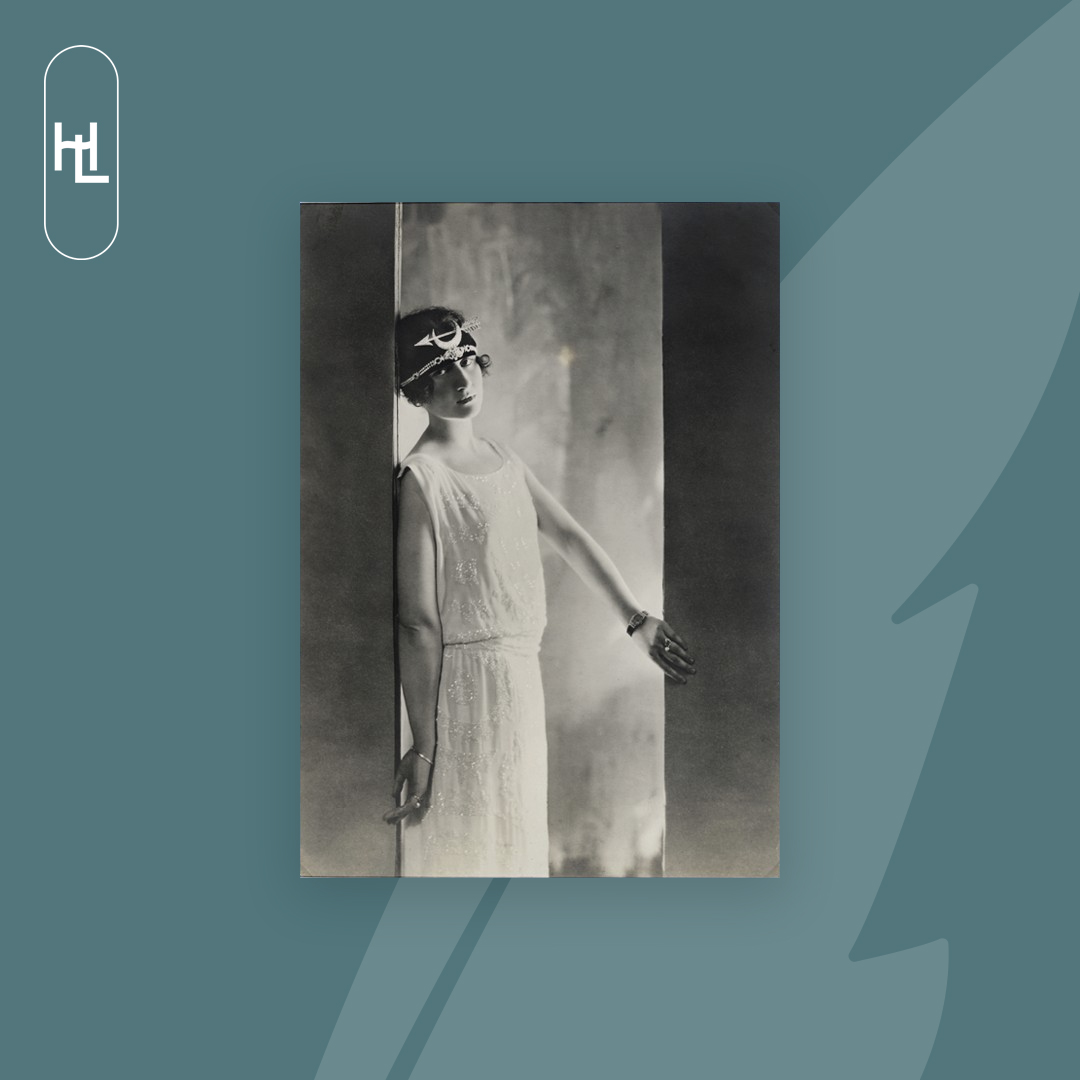

Photographie originale de Mademoiselle Simone de Caillavet-Stoicesco, modèle de Mlle de Saint-Loup dans la Recherche. Elle n’apparaît que dans les vingt dernières pages du Temps retrouvé mais son rôle est essentiel dans le roman de Proust pour comprendre le passage du Temps. Tirage argentique de 1922.
À ce sujet, on pourra lire avec profit l’article de Jacques Letertre dans le Bulletin Marcel Proust n°71, publié en décembre 2021 : « Mademoiselle de Saint-Loup, clé de voûte de la Recherche »
_
© Hôtel Littéraire Le Swann / Suzanne Nagy.
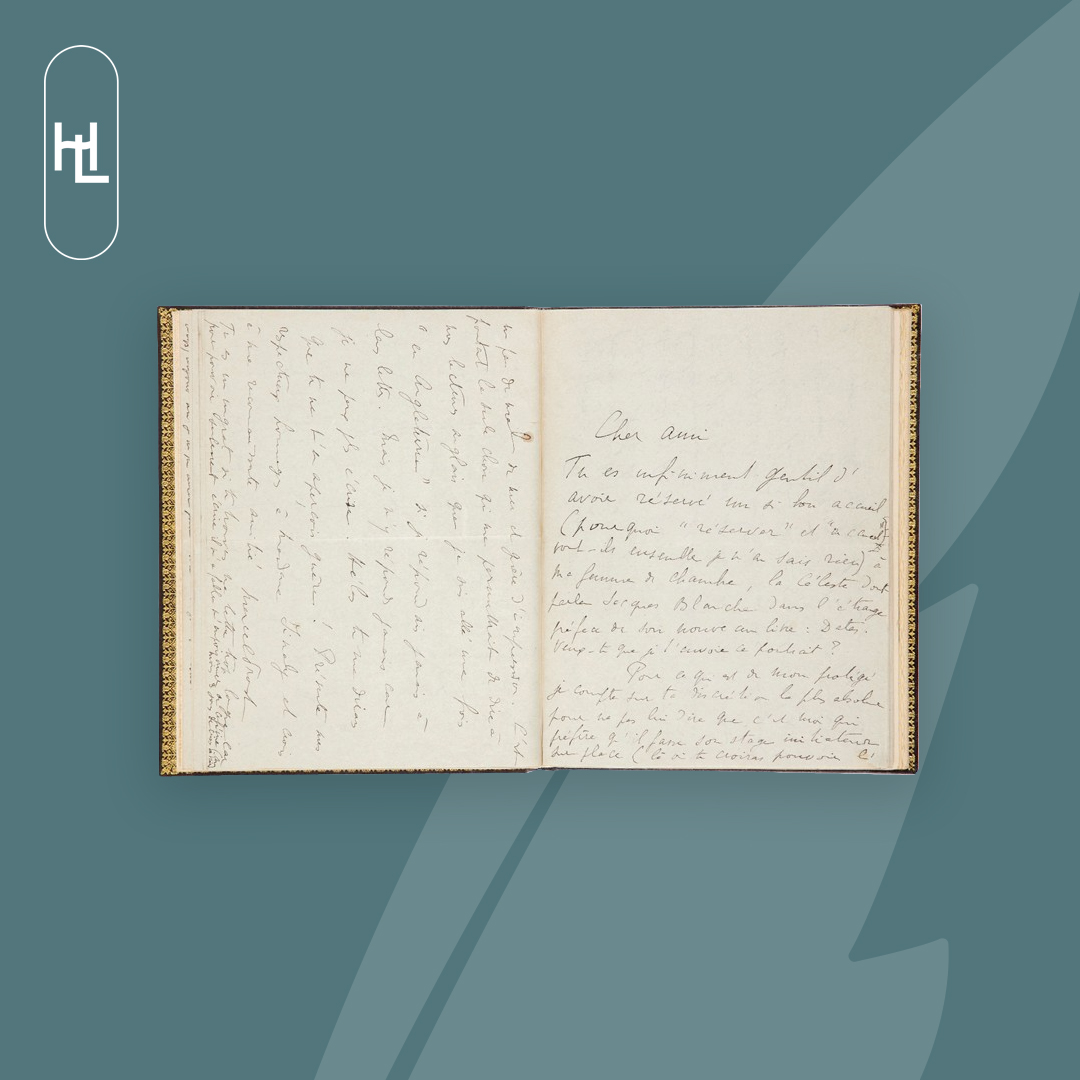

Lettre de Marcel Proust à Horace Finaly, fin février 1921, où l’on apprend avec surprise que Proust s’est rendu en Angleterre. Elle provient d’un ensemble de lettres inédites écrites par Proust à son ami d’enfance, directeur général de la Banque de Paris. Leur publication est prévue en mai 2021 avec une préface de Jacques Letertre et un appareil critique préparé par Thierry Laget.
« Mon cher Horace
(…) Cher ami je suis ennuyé de tant me fatiguer (et probablement avec le seul résultat de t’assommer) quand je t’écris. Si mes yeux qui n’y voient plus, si ma main crispée, pouvaient écrire, j’évoquerais notre vie d’Ostende où j’étais grâce à la bonté de tes parents, de ton oncle et à la tienne et où toi et moi nous étions encore si bêtes (pardon !) que nous n’avons pas eu une seule fois l’idée d’aller à Bruges que nous remplacions hebdomadairement par les richesses moins artistiques du Blankenberk. Et un jour, t’en souviens-tu[,] nous avons pris tous les deux le bateau jusqu’à Douvres, avons sans même descendre pris le bateau suivant et sommes rentrés seulement avec un peu de mal de mer et guère d’impression. C’est pourtant la seule chose qui me permettrait de dire à mes lecteurs anglais que je suis allé une fois « en Angleterre » si je répondais jamais à leurs lettres. Mais je n’y réponds jamais car je ne peux plus écrire. Hélas tu me diras que tu ne t’en aperçois guère ! Présente mes respectueux hommages à Madame Finaly et crois à ma reconnaissante amitié
Marcel Proust
Tu es un ingrat si tu trouves ma lettre trop longue car pour pouvoir seulement écrire il m’a fallu m’empoisonner de caféine (au moins 3 jours de crise à venir). »
_
© Hôtel Littéraire Le Swann / Stéphane Briolant
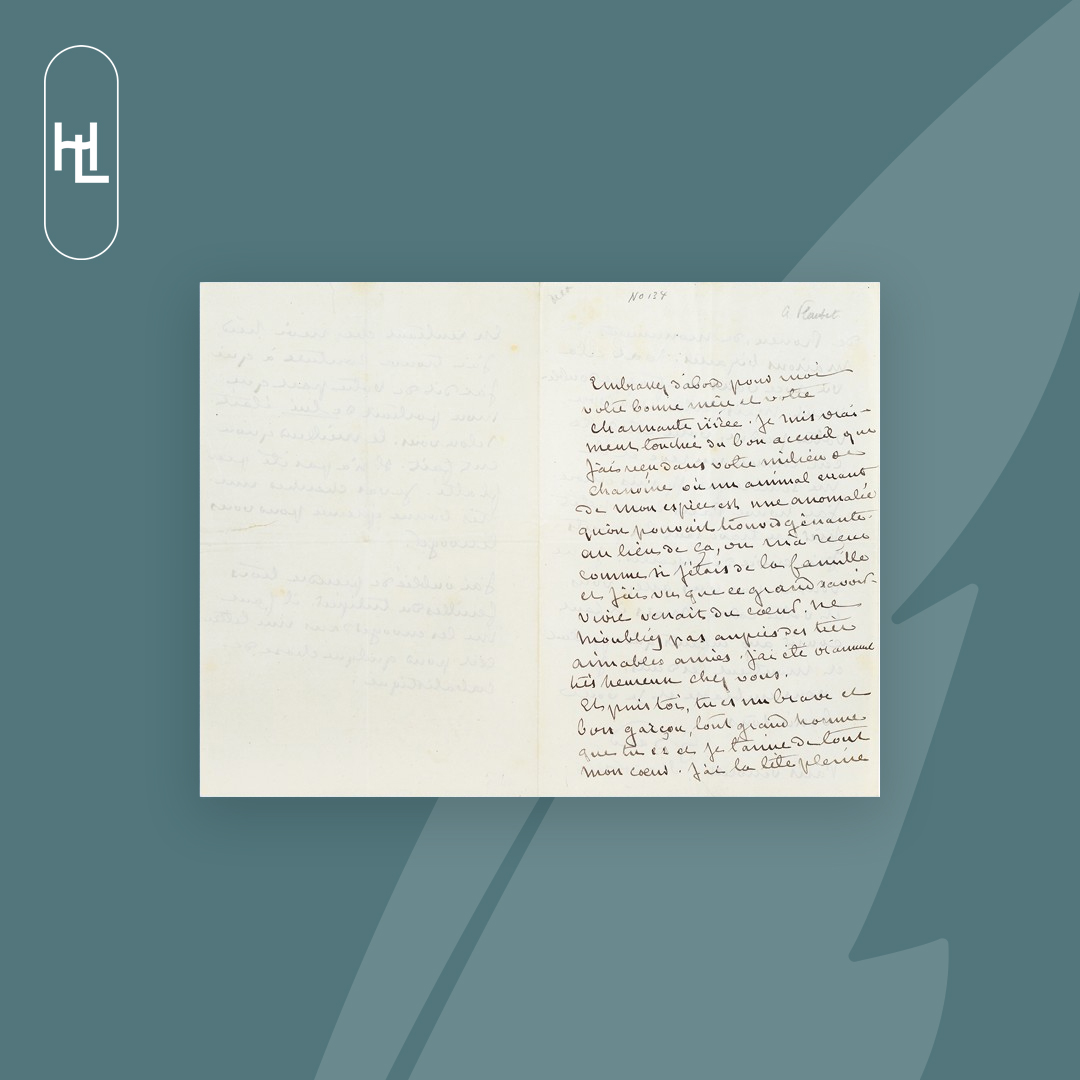
 Lettre de George Sand à Gustave Flaubert. Paris, 31 août 1866.
Lettre de George Sand à Gustave Flaubert. Paris, 31 août 1866.
Émouvante lettre de George Sand à Gustave Flaubert, écrite le lendemain de sa première visite à Croisset et marquant le début d’une longue et belle amitié entre les deux écrivains :
« Embrassez d’abord pour moi votre bonne mère et votre charmante nièce. Je suis vraiment touchée du bon accueil que j’ai reçu dans votre milieu de chanoine où un animal errant de mon espèce est une anomalie qu’on pourrait trouver gênante. (…)
Et puis, toi, tu es un brave et bon garçon, tout grand homme que tu es, et je t’aime de tout mon cœur. J’ai la tête pleine de Rouen, de monuments, de maisons bizarres. Tout cela vu avec vous me frappe doublement. Mais votre maison, votre jardin, votre citadelle, c’est comme un rêve, et il me semble que j’y suis encore. J’ai trouvé Paris tout petit hier, en traversant les ponts. J’ai envie de repartir. Je ne vous ai pas vus assez, vous et votre cadre. Mais il faut courir aux enfants, qui appellent et montrent les dents. Je vous embrasse et je vous bénis tous.
J’ai oublié de prendre trois feuilles du tulipier, il faut me les envoyer dans une lettre, c’est pour quelque chose de cabalistique ».
_
© Hôtel Littéraire Gustave Flaubert / Suzanne Nagy.
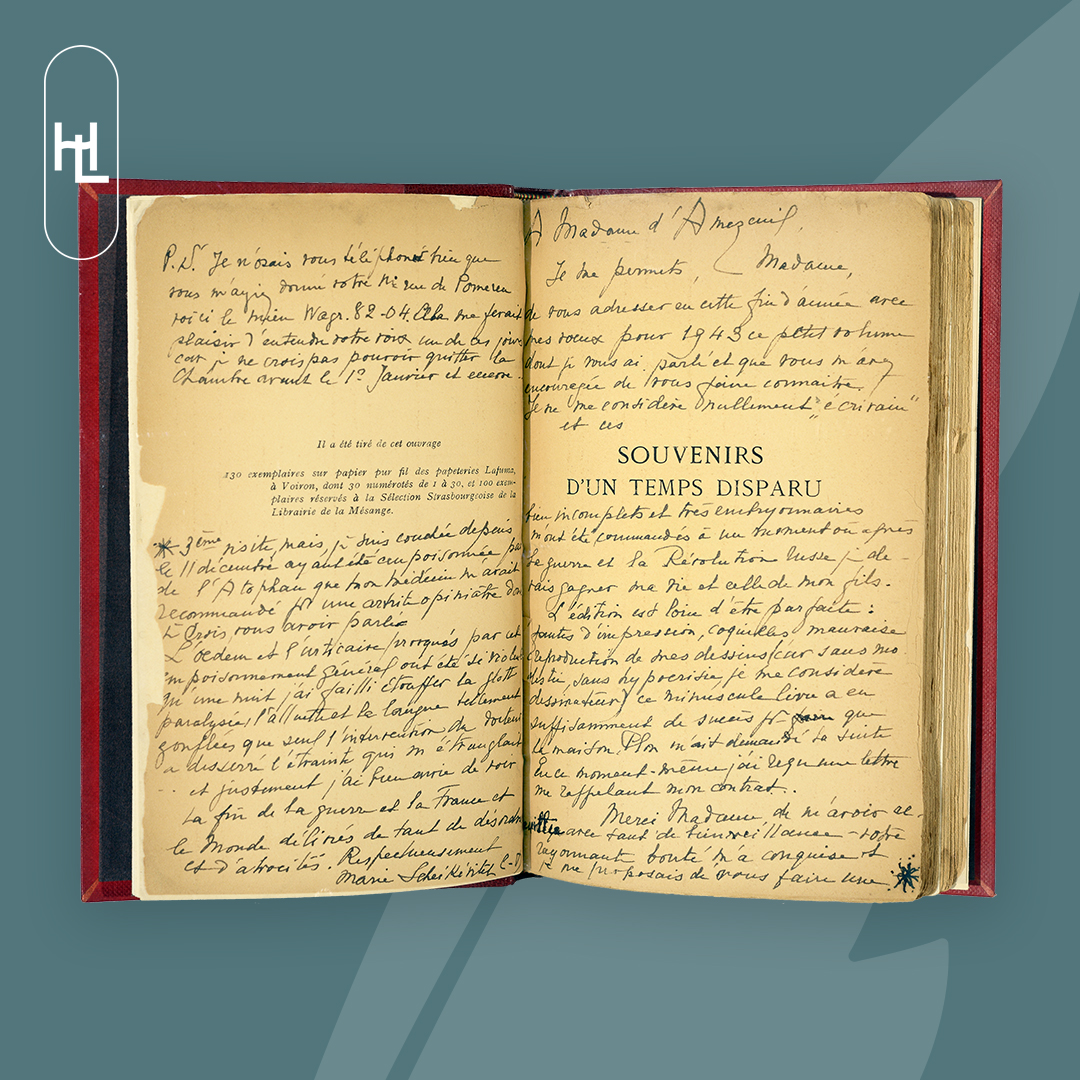
 L’Hôtel Litteraire Le Swann présente une édition originale de Souvenirs d’un temps disparu de Marie Scheikévitch. Fille d’un avocat russe et figure du Paris littéraire et mondain de la Belle Époque, elle fut une grande amie et un soutien pour Marcel Proust. Elle a joué un rôle important dans la première réception de Du côté de chez Swann en mettant ses relations influentes au service du romancier.
L’Hôtel Litteraire Le Swann présente une édition originale de Souvenirs d’un temps disparu de Marie Scheikévitch. Fille d’un avocat russe et figure du Paris littéraire et mondain de la Belle Époque, elle fut une grande amie et un soutien pour Marcel Proust. Elle a joué un rôle important dans la première réception de Du côté de chez Swann en mettant ses relations influentes au service du romancier.
Proust lui rendra hommage dans Sodome et Gomorrhe sous le voile de Mme Timoléon d’Amoncourt, « petite dame brune, extrêmement jolie » habituée du salon de la duchesse de Guermantes et dévouée à la cause de la littérature, « amie successivement — nullement amante, elle était de mœurs fort pures — et exclusivement de chaque grand écrivain qui lui donnait tous ses manuscrits, écrivait des livres pour elle. »
_
Marie Scheikévitch, Souvenirs d’un temps disparu.
Collection « Choses vues » Plon Paris 1935, édition originale. Reliure demi-chagrin rouge, dos à 5 nerfs. Envoi à Mme d’Amezeuil.
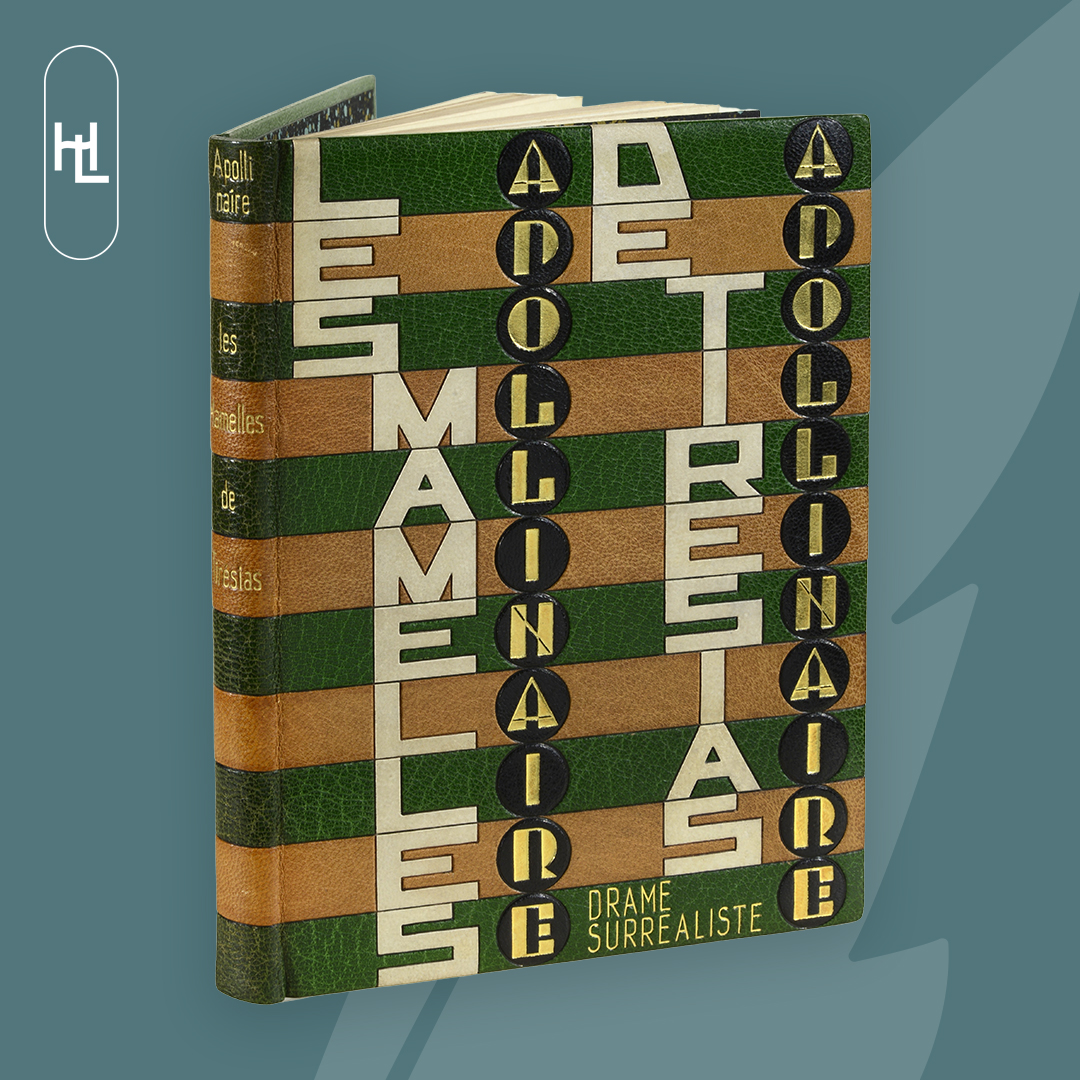

La Société des Hôtels Litteraires présente une édition originale des célèbres Mamelles de Tiresias de Guillaume Apollinaire, un « drame surréaliste » qui déchaîna le scandale dans une petite salle montmartroise, le 24 juin 1917. Forgé par le poète, le néologisme apparaît sur la page de titre et il en donne une définition en préface, remarquant notamment : “Quand l’homme a voulu imiter la marche, il a créé la roue qui ne ressemble pas à une jambe. Il a fait ainsi du surréalisme sans le savoir” (Préface, p. 12).
Cet exemplaire est doté d’une superbe reliure Art Déco de Paul Bonet exécutée pour René Gaffé, qui a ensuite enrichi l’exemplaire de pièces autographes importantes. Il est l’un des 4 tirages sur japon impérial (nº 3), deuxième papier après deux vieux japon à la forme, signé par Apollinaire au colophon.
_
Guillaume APOLLINAIRE. Les Mamelles de Tiresias.
Paris, Editions SIC, 1918. In-12, maroquin à bandes horizontales bicolores vert et citron alternées se poursuivant sur les plats et le dos lisse, titre mosaïqué en lettres de maroquin blanc et nom de l’auteur en lettres dorées sur pastilles mosaïquées de maroquin noir sur le premier plat. Edition originale. Frontispice et 6 compositions cubistes du peintre Serge Férat, à pleine page.
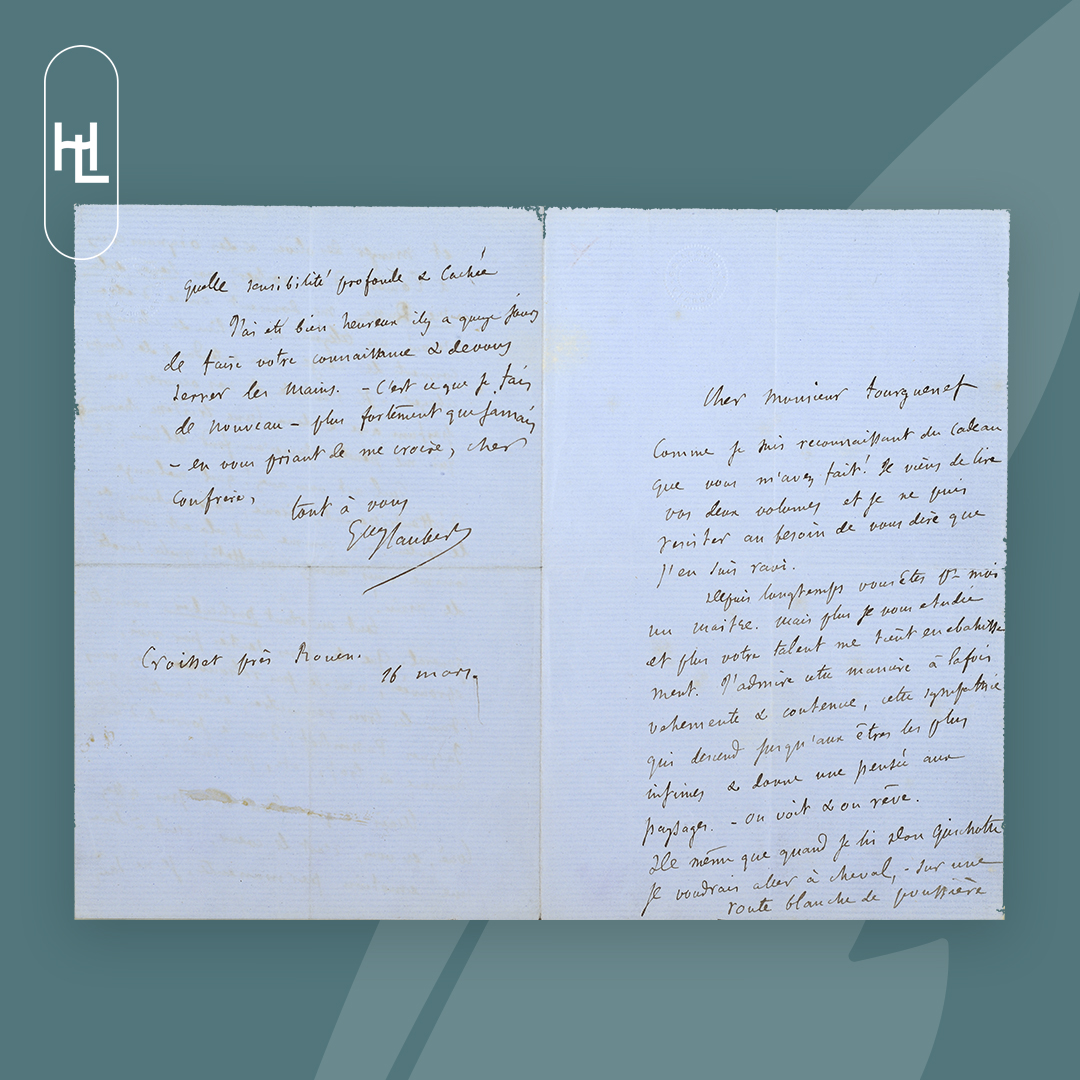
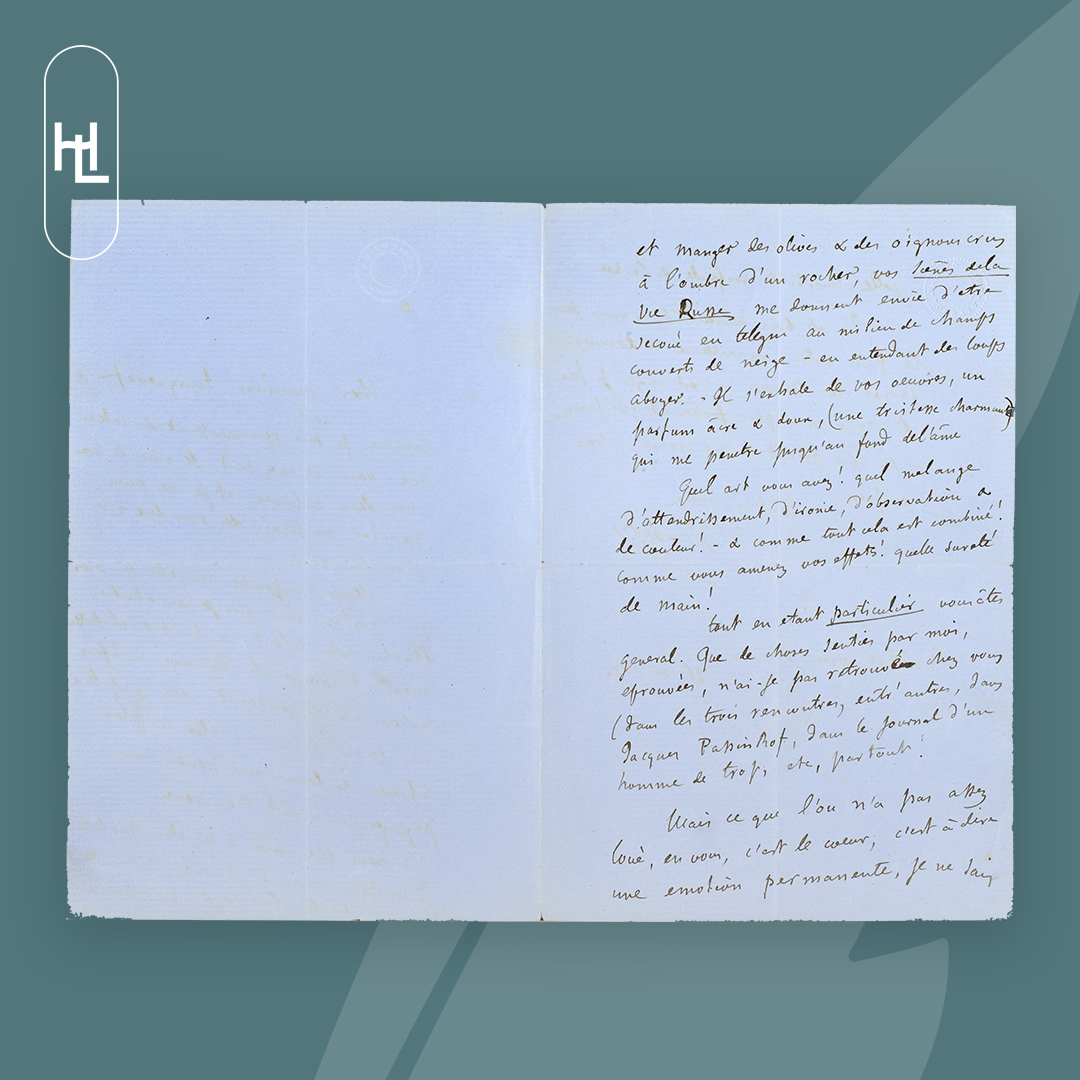
L’Hôtel Litteraire Gustave Flaubert présente une précieuse lettre envoyée par Gustave Flaubert à Ivan Tourgueniev, le 16 mars 1863. Les deux écrivains viennent de se rencontrer pour la première fois à Paris lors d’un dîner Magny. La sympathie est immédiate, Tourgueniev admire déjà profondément l’auteur de Mme Bovary. Il lui envoie ses livres en lui disant son « regret de [l’] avoir rencontré si tard dans la vie. ». Voici la première lettre que Flaubert lui écrit pour le remercier, marquant le début d’une très belle correspondance qui ne s’achèvera qu’à la mort de Flaubert.
« Depuis longtemps, vous êtes pour moi un maître. Mais plus je vous étudie, et plus votre talent me tient en ébahissement. J’admire cette manière à la fois véhémente et contenue, cette sympathie qui descend jusqu’aux êtres les plus infimes et donne une pensée aux paysages. On voit et on rêve. »
_
Lettre de Gustave Flaubert à Ivan Tourgueniev
16 mars 1863
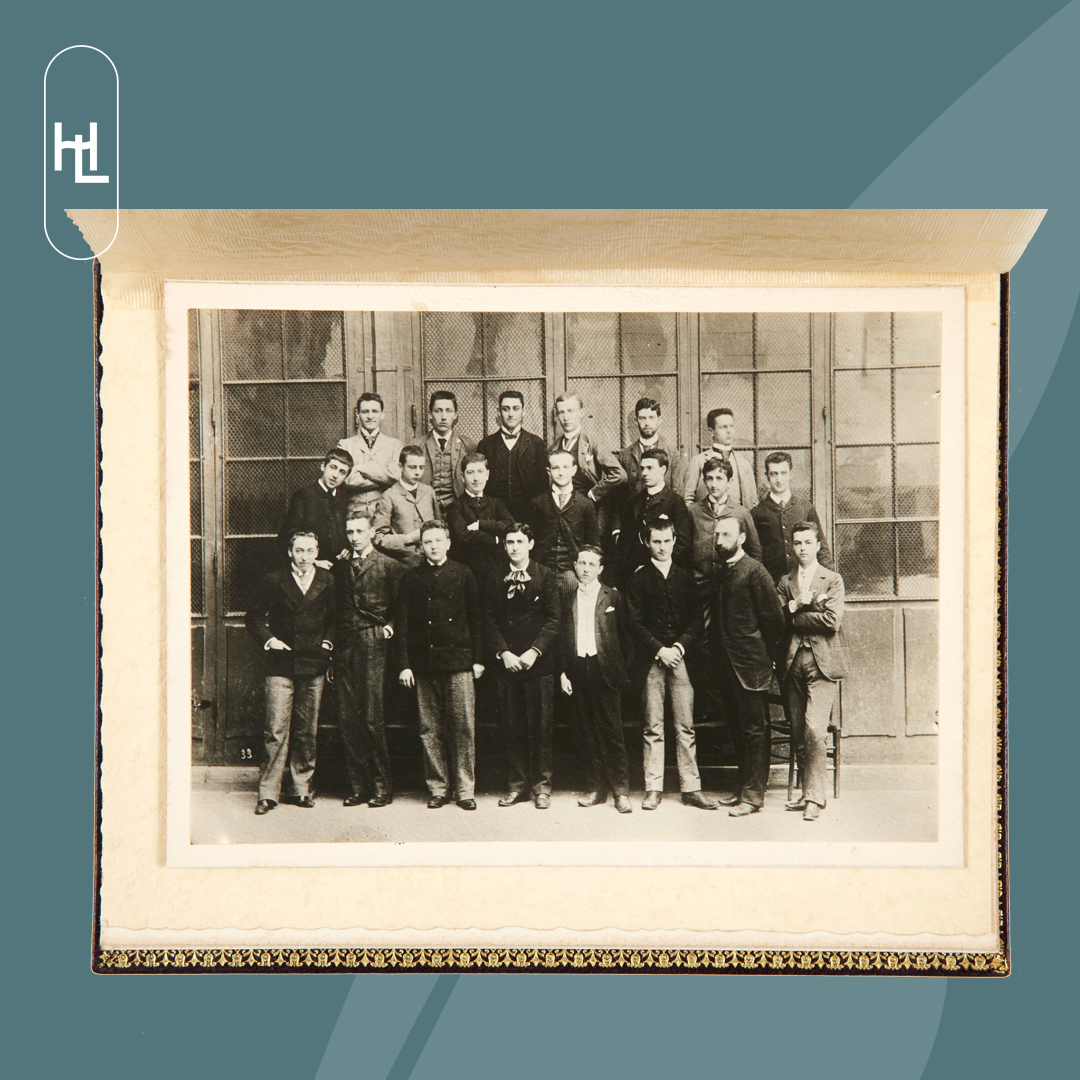

L’Hôtel Litteraire Le Swann présente le tirage original de cette célèbre photo de classe de Marcel Proust, en classe de philosophie au lycée Condorcet, durant l’année scolaire 1888-1889. Proust, la tête penchée, est à gauche au second rang. Son professeur de philosophie Alphonse Darlu est au premier rang (second à droite). Parmi ses camarades, on reconnaît son ami Horace Finaly, futur directeur de la Banque de Paris.
_
Photographie originale de Marcel Proust.
Paris, 1888. Tirage argentique d’époque (107 x 152 mm).
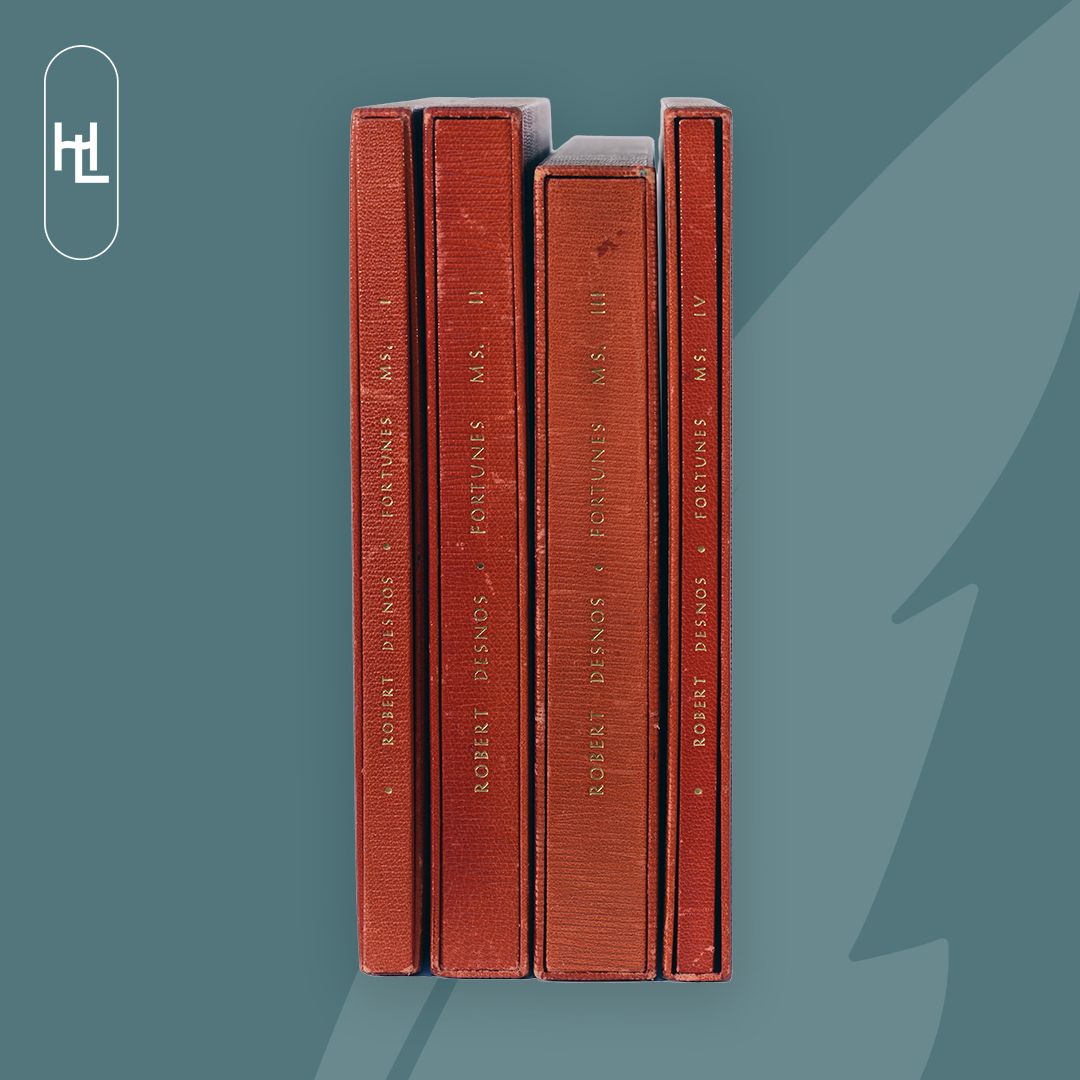

La Société des Hôtels Littéraires dévoile cet ensemble de cent vingt-trois poèmes autographes, dont quatre-vingt-cinq inédits, réunis dans quatre étuis chemises en maroquin rouge, avec pour seule mention au dos : Robert Desnos Fortunes MS. I, II, III et IV. À l’intérieur, trois cahiers d’écolier d’origines diverses et un cahier à dessin, le tout étant composé de poèmes écrits entre 1936-1937 que Desnos décida de mettre au propre en 1940.
Parmi eux, une anthologie de vingt poèmes désignés par Desnos à notre attention par une croix et restés inédits jusqu’à aujourd’hui seront prochainement publiés dans L’Étoile de mer, le cahier annuel des Amis de Robert Desnos.
_
Robert Desnos,
Fortunes. 1936-1940
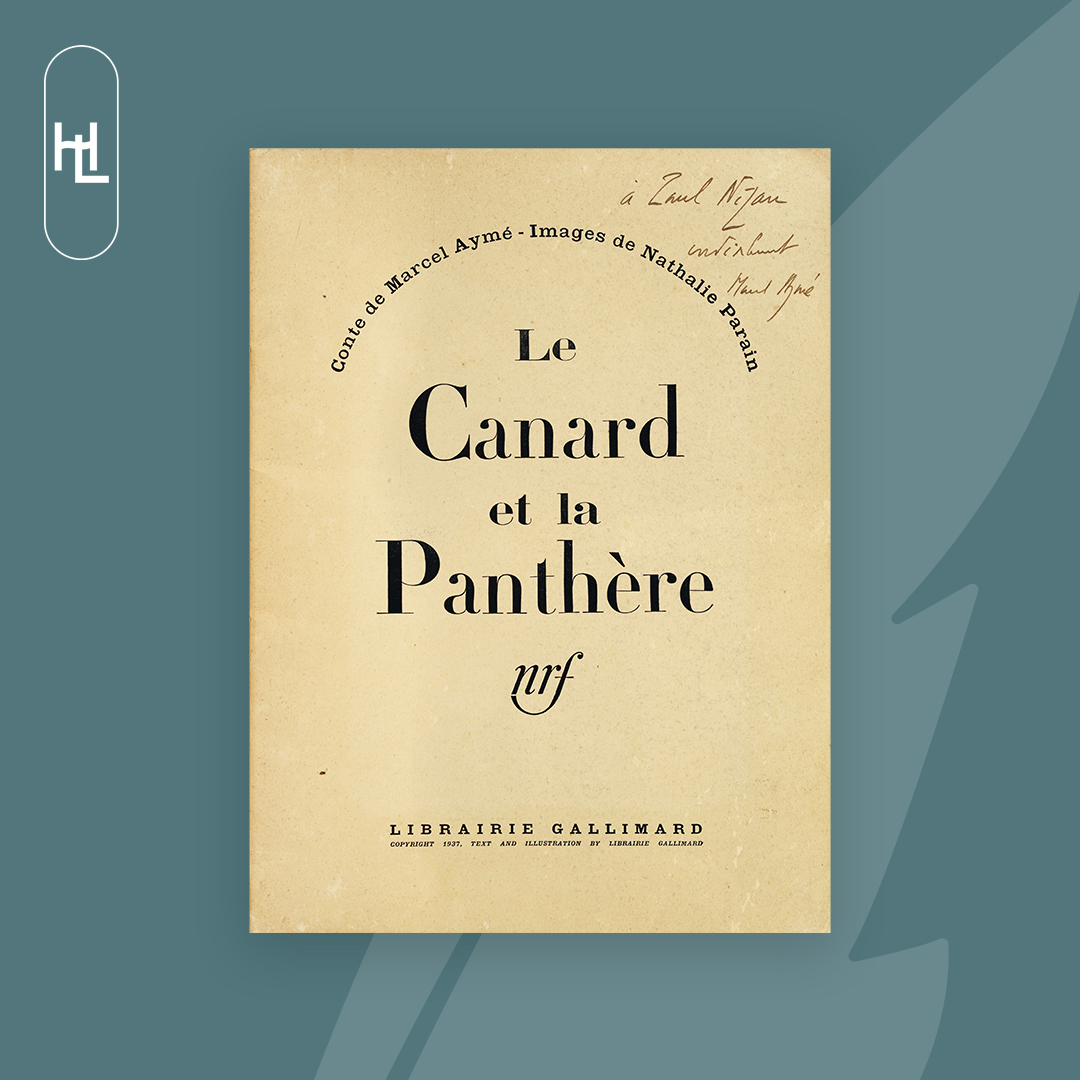

L’Hôtel Litteraire Marcel Aymé présente ce rarissime exemplaire du roman de Marcel Aymé, illustré par la dessinatrice Nathalie Parain, avec un envoi manuscrit de l’auteur adressé à Paul Nizan. L’auteur de l’essai Aden Arabie dont l’incipit est resté célèbre : « J’avais vingt ans. Je ne laisserai personne dire que c’est le plus bel âge de la vie », écrivit cette critique dans le journal Ce Soir en décembre 1938 à propos de Gustalin : « M. Marcel Aymé parle avec une grande force réaliste et lyrique de l’amour charnel. Il parle encore mieux des animaux, les plus grandes réussites du roman sont les pages où tout paraît ramené au niveau d’un chien poli et narquois, où tous les gestes des hommes sont regardés du ras du sol. Jamais M. Marcel Aymé n’a tant de flair qu’à ce moment-là. On se dit qu’il pourrait être notre plus grand animalier. »
_
Marcel Aymé.
Le Canard et la Panthère
Paris, Gallimard, 1937. Edition originale


